|
Admissibility of Horizontal Gaze Nystagmus Evidence
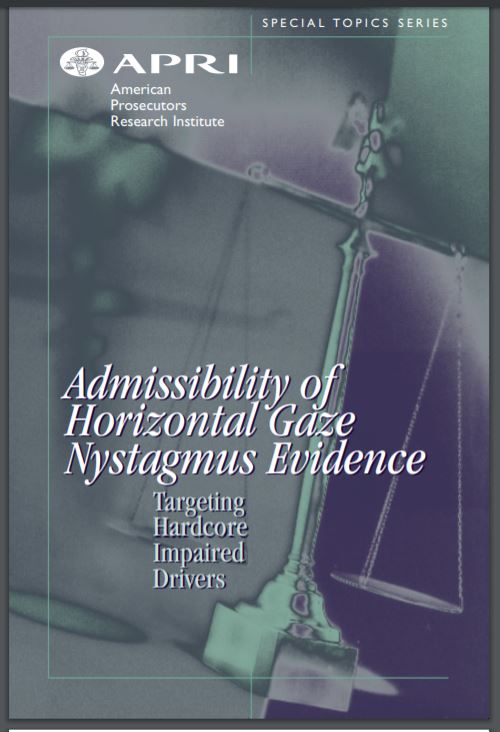 This guide explores the admissibility of the Horizontal Gaze Nystagmus (HGN) test in DUI prosecutions, emphasizing its scientific validity and reliability as a field sobriety test. It outlines the foundational legal hurdles prosecutors face under standards like Frye and Daubert, and provides strategies for establishing admissibility, including expert testimony and pretrial motions. The publication also highlights the role of optometrists and research supporting HGN's effectiveness, especially in detecting impairment among repeat offenders who may mask other signs of intoxication. This guide explores the admissibility of the Horizontal Gaze Nystagmus (HGN) test in DUI prosecutions, emphasizing its scientific validity and reliability as a field sobriety test. It outlines the foundational legal hurdles prosecutors face under standards like Frye and Daubert, and provides strategies for establishing admissibility, including expert testimony and pretrial motions. The publication also highlights the role of optometrists and research supporting HGN's effectiveness, especially in detecting impairment among repeat offenders who may mask other signs of intoxication.
|
|
Alcohol Toxicology for Prosecutors
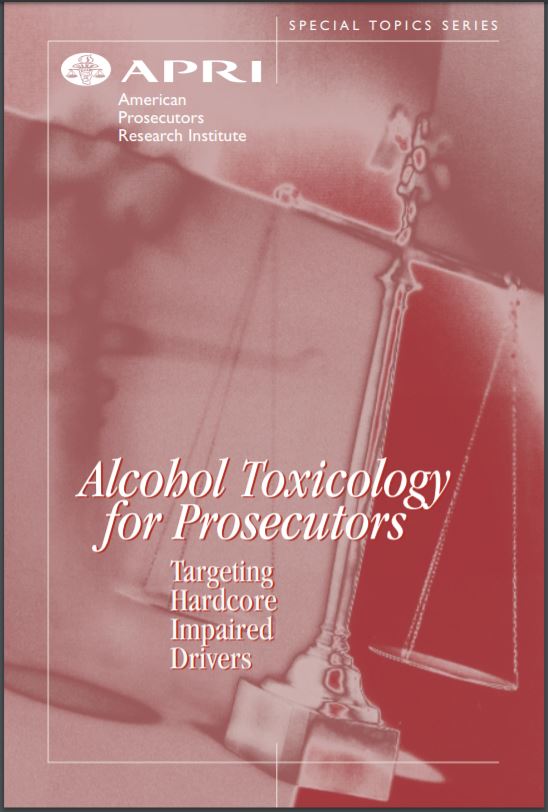 Alcohol Toxicology for Prosecutors provides prosecutors with a comprehensive guide to alcohol toxicology, focusing on how alcohol is absorbed, distributed, and eliminated in the body, and how these processes affect blood alcohol concentration (BAC). It explains scientific methods like retrograde extrapolation to estimate BAC at the time of driving, counter common defenses such as post-incident drinking or rising BAC claims, and interpret various types of test results. The guide emphasizes using expert testimony and scientific principles to strengthen DUI cases, especially against repeat offenders. Alcohol Toxicology for Prosecutors provides prosecutors with a comprehensive guide to alcohol toxicology, focusing on how alcohol is absorbed, distributed, and eliminated in the body, and how these processes affect blood alcohol concentration (BAC). It explains scientific methods like retrograde extrapolation to estimate BAC at the time of driving, counter common defenses such as post-incident drinking or rising BAC claims, and interpret various types of test results. The guide emphasizes using expert testimony and scientific principles to strengthen DUI cases, especially against repeat offenders.
|
|
Basic Trial Techniques for Prosecutors
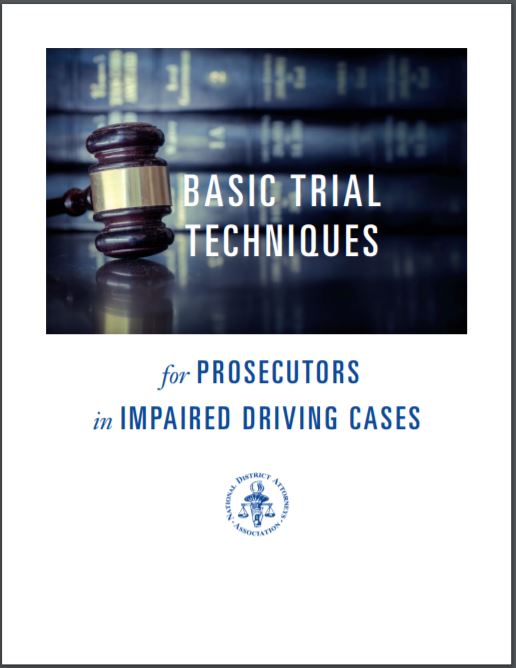 Basic Trial Techniques for Prosecutors is a comprehensive guide for prosecutors handling impaired driving cases, offering practical strategies for every stage of trial—from pre-trial preparation and jury selection to opening statements, witness examination, and closing arguments. It emphasizes the importance of developing a compelling case theme, anticipating defenses, and presenting evidence clearly and persuasively. The guide also provides detailed techniques for cross-examination and rebuttal, aiming to help prosecutors advocate effectively while maintaining professionalism and integrity in pursuit of justice. Basic Trial Techniques for Prosecutors is a comprehensive guide for prosecutors handling impaired driving cases, offering practical strategies for every stage of trial—from pre-trial preparation and jury selection to opening statements, witness examination, and closing arguments. It emphasizes the importance of developing a compelling case theme, anticipating defenses, and presenting evidence clearly and persuasively. The guide also provides detailed techniques for cross-examination and rebuttal, aiming to help prosecutors advocate effectively while maintaining professionalism and integrity in pursuit of justice.
|
|
Breath Testing for Prosecutors
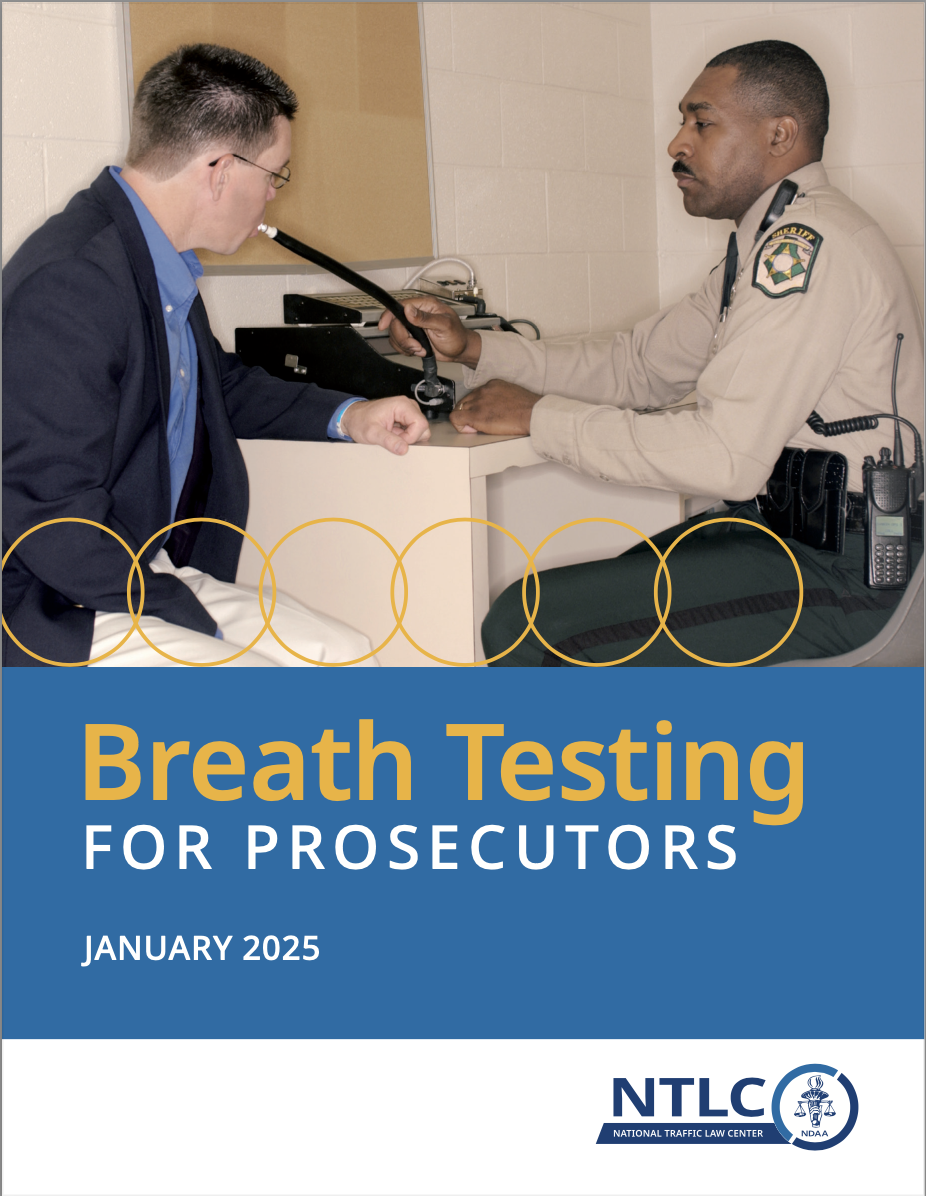 The 2025 edition of Breath Testing for Prosecutors provides a comprehensive guide to evidential breath testing (EBT) in DUI cases, covering the science behind breath alcohol analysis, instrument types, calibration protocols, and quality assurance standards. It also addresses common legal and scientific challenges to breath test results, such as residual mouth alcohol, medical conditions, and environmental interference, offering strategies for prosecutors to effectively counter these defenses. The monograph emphasizes the reliability of modern breath testing when properly maintained and operated, and serves as a vital resource for legal professionals handling impaired driving cases. The 2025 edition of Breath Testing for Prosecutors provides a comprehensive guide to evidential breath testing (EBT) in DUI cases, covering the science behind breath alcohol analysis, instrument types, calibration protocols, and quality assurance standards. It also addresses common legal and scientific challenges to breath test results, such as residual mouth alcohol, medical conditions, and environmental interference, offering strategies for prosecutors to effectively counter these defenses. The monograph emphasizes the reliability of modern breath testing when properly maintained and operated, and serves as a vital resource for legal professionals handling impaired driving cases.
|
|
Cannabis Impairment Detection Workshop Handbook
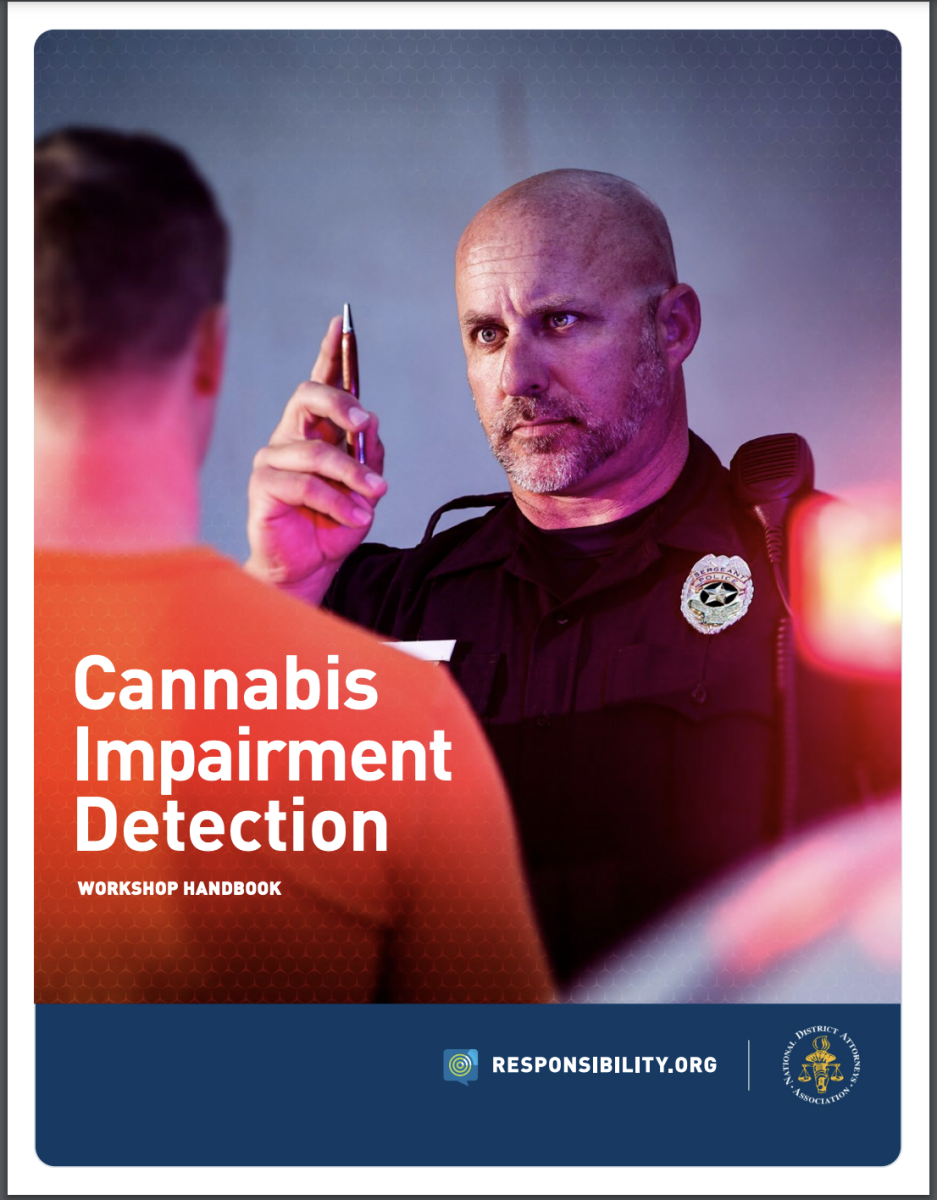 The Cannabis Impairment Detection Workshop Handbook provides a comprehensive guide for law enforcement and prosecutors to plan and conduct training workshops that simulate cannabis impairment using volunteer consumers. It outlines legal, logistical, and safety considerations for hosting these workshops, including cannabis procurement, stakeholder engagement, consumer recruitment, and instructional content. The handbook emphasizes the importance of hands-on training to improve detection of cannabis-impaired driving and foster collaboration between law enforcement and the cannabis community. The Cannabis Impairment Detection Workshop Handbook provides a comprehensive guide for law enforcement and prosecutors to plan and conduct training workshops that simulate cannabis impairment using volunteer consumers. It outlines legal, logistical, and safety considerations for hosting these workshops, including cannabis procurement, stakeholder engagement, consumer recruitment, and instructional content. The handbook emphasizes the importance of hands-on training to improve detection of cannabis-impaired driving and foster collaboration between law enforcement and the cannabis community.
|
|
CDL Quick Reference Guide
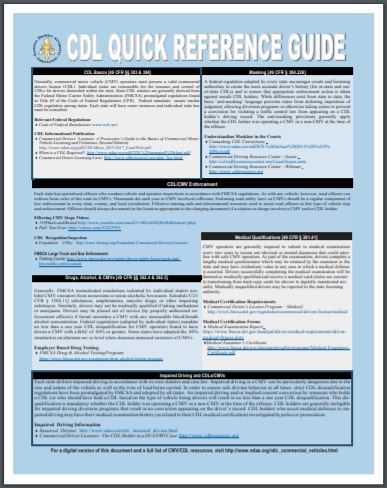 The CDL Quick Reference Guide provides an overview of federal and state regulations governing commercial driver’s licenses (CDLs) and commercial motor vehicles (CMVs). It covers key topics such as licensing requirements, anti-masking rules, medical qualifications, drug and alcohol testing, impaired and distracted driving enforcement, hazardous materials transport, crash investigations, and criminal activity involving CMVs. The guide also includes links to training resources, legal references, and enforcement tools to assist law enforcement, prosecutors, and other stakeholders in ensuring roadway safety and regulatory compliance. The CDL Quick Reference Guide provides an overview of federal and state regulations governing commercial driver’s licenses (CDLs) and commercial motor vehicles (CMVs). It covers key topics such as licensing requirements, anti-masking rules, medical qualifications, drug and alcohol testing, impaired and distracted driving enforcement, hazardous materials transport, crash investigations, and criminal activity involving CMVs. The guide also includes links to training resources, legal references, and enforcement tools to assist law enforcement, prosecutors, and other stakeholders in ensuring roadway safety and regulatory compliance.
|
|
CDL White Paper—How to Establish a CDL Advisory Committee
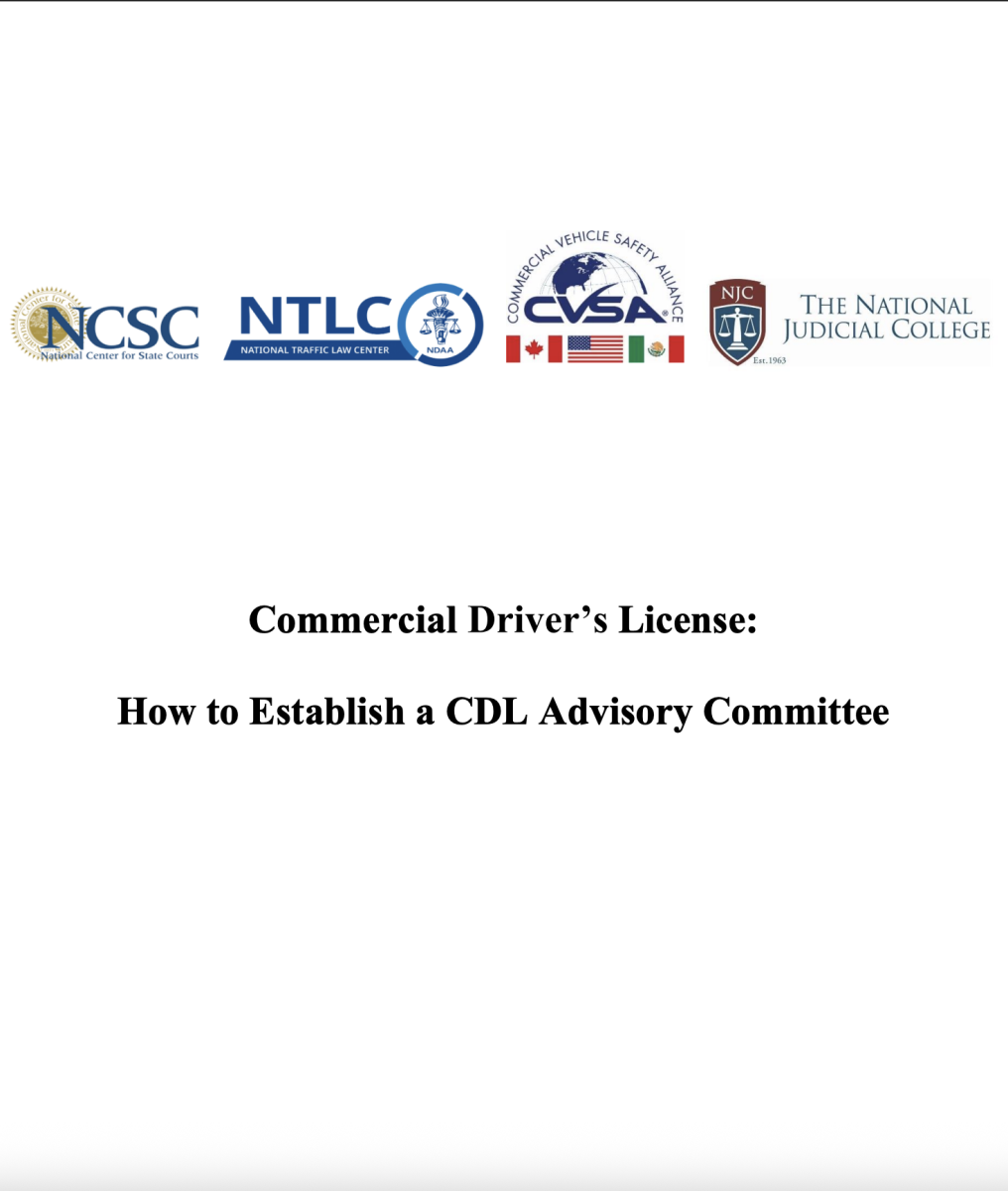 This white paper outlines how to establish a Commercial Driver’s License (CDL) Advisory Committee to improve communication and coordination among stakeholders involved in CDL enforcement, adjudication, and licensing. It provides guidance on committee purpose, membership, funding sources, meeting logistics, and the benefits of fostering collaboration to ensure accurate driver records and enhance traffic safety. The document emphasizes that such committees can break down silos, promote shared understanding, and ultimately help save lives on the road. This white paper outlines how to establish a Commercial Driver’s License (CDL) Advisory Committee to improve communication and coordination among stakeholders involved in CDL enforcement, adjudication, and licensing. It provides guidance on committee purpose, membership, funding sources, meeting logistics, and the benefits of fostering collaboration to ensure accurate driver records and enhance traffic safety. The document emphasizes that such committees can break down silos, promote shared understanding, and ultimately help save lives on the road.
|
|
Challenges and Defenses II: Claims and Responses to Common Challenges and Defenses in Driving While Impaired Cases
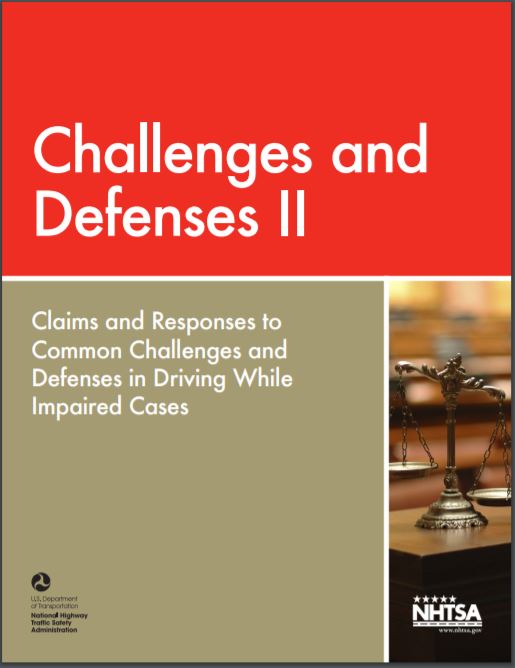 The Challenges and Defenses II guide provides prosecutors with detailed responses to common defense claims in impaired driving cases, particularly those involving prescription drugs, over-the-counter medications, and scientific challenges to breath and blood testing. It addresses defenses such as involuntary intoxication, medical conditions like diabetes and GERD, and technical claims about testing procedures, measurement uncertainty, and source code access. The guide emphasizes evidence-based rebuttals and strategic courtroom approaches to uphold the reliability of DUI investigations and prosecutions. The Challenges and Defenses II guide provides prosecutors with detailed responses to common defense claims in impaired driving cases, particularly those involving prescription drugs, over-the-counter medications, and scientific challenges to breath and blood testing. It addresses defenses such as involuntary intoxication, medical conditions like diabetes and GERD, and technical claims about testing procedures, measurement uncertainty, and source code access. The guide emphasizes evidence-based rebuttals and strategic courtroom approaches to uphold the reliability of DUI investigations and prosecutions.
|
|
Challenges & Defenses III: Responses to Common Challenges and Defenses in Impaired Driving Cases
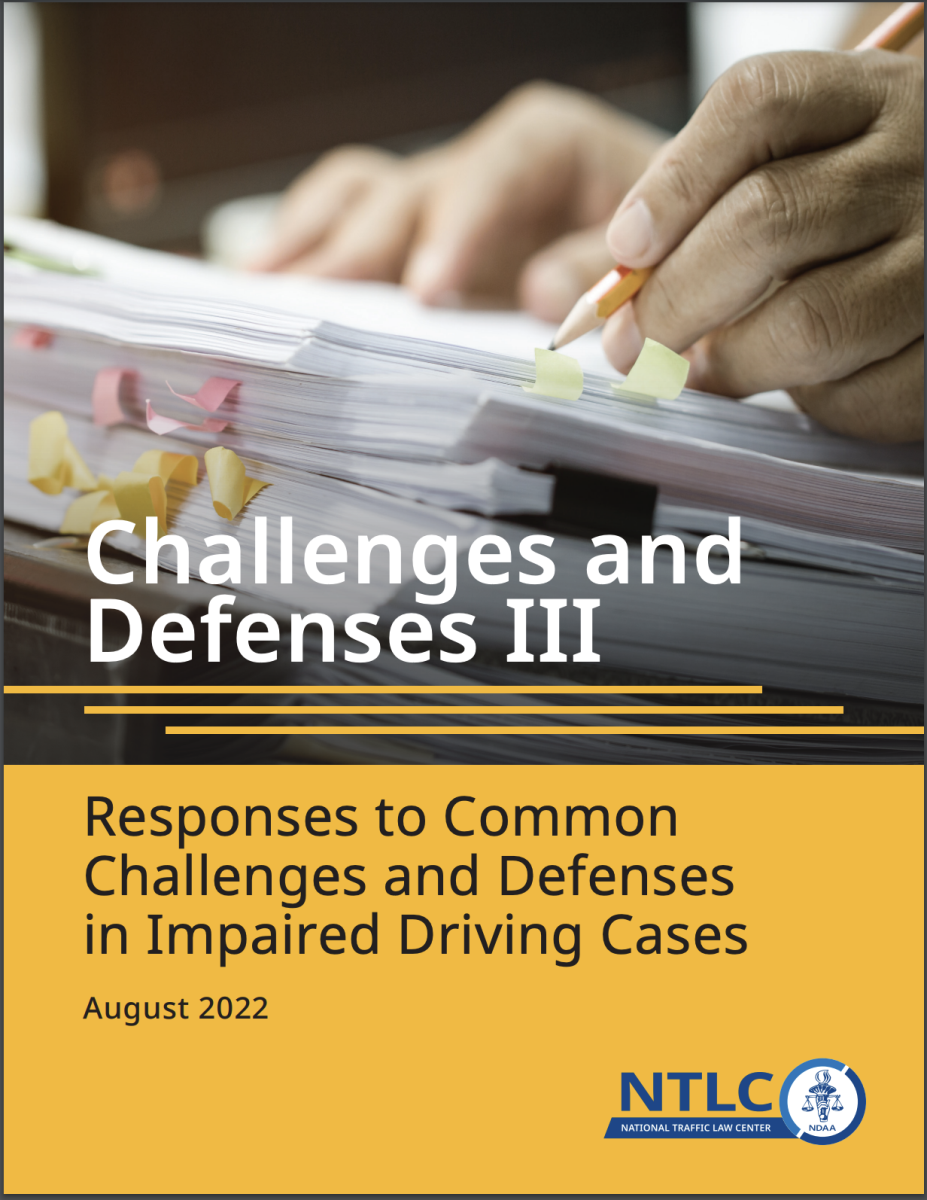 The Challenges and Defenses III monograph provides prosecutors with practical strategies to counter common defenses in drug-impaired driving cases, including challenges to toxicology testimony, incomplete drug recognition evaluations, recalled or expired evidence, and lack of driving proof. It also addresses behavioral defenses such as ADHD, autism spectrum disorder, and auto-brewery syndrome, and offers guidance on handling commercial driver’s license (CDL) cases and jury selection. The resource emphasizes preparation, scientific understanding, and effective courtroom techniques to help prosecutors navigate complex impaired driving prosecutions. The Challenges and Defenses III monograph provides prosecutors with practical strategies to counter common defenses in drug-impaired driving cases, including challenges to toxicology testimony, incomplete drug recognition evaluations, recalled or expired evidence, and lack of driving proof. It also addresses behavioral defenses such as ADHD, autism spectrum disorder, and auto-brewery syndrome, and offers guidance on handling commercial driver’s license (CDL) cases and jury selection. The resource emphasizes preparation, scientific understanding, and effective courtroom techniques to help prosecutors navigate complex impaired driving prosecutions.
|
|
Commercial Drivers’ Licenses: A Prosecutor’s Guide to the Basics of Commercial Motor Vehicle Licensing and Violations, Second Edition
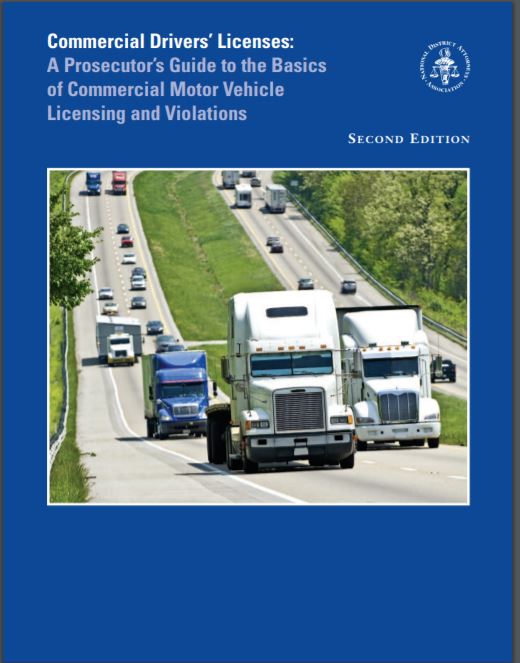 The CDL Monograph: A Prosecutor’s Guide to the Basics of Commercial Motor Vehicle Licensing and Violations provides a comprehensive overview of federal and state regulations governing commercial driver’s licenses (CDLs) and commercial motor vehicles (CMVs). It covers licensing requirements, medical and drug testing standards, vehicle classifications, and enforcement procedures, emphasizing the importance of accurate conviction reporting and the prohibition of “masking” violations. The guide also outlines prosecutorial strategies for handling CMV-related crashes, including evidence collection, driver and carrier responsibilities, and legal considerations for disqualification and criminal charges. The CDL Monograph: A Prosecutor’s Guide to the Basics of Commercial Motor Vehicle Licensing and Violations provides a comprehensive overview of federal and state regulations governing commercial driver’s licenses (CDLs) and commercial motor vehicles (CMVs). It covers licensing requirements, medical and drug testing standards, vehicle classifications, and enforcement procedures, emphasizing the importance of accurate conviction reporting and the prohibition of “masking” violations. The guide also outlines prosecutorial strategies for handling CMV-related crashes, including evidence collection, driver and carrier responsibilities, and legal considerations for disqualification and criminal charges.
|
|
Constitutional Law Issues in Impaired Driving Cases
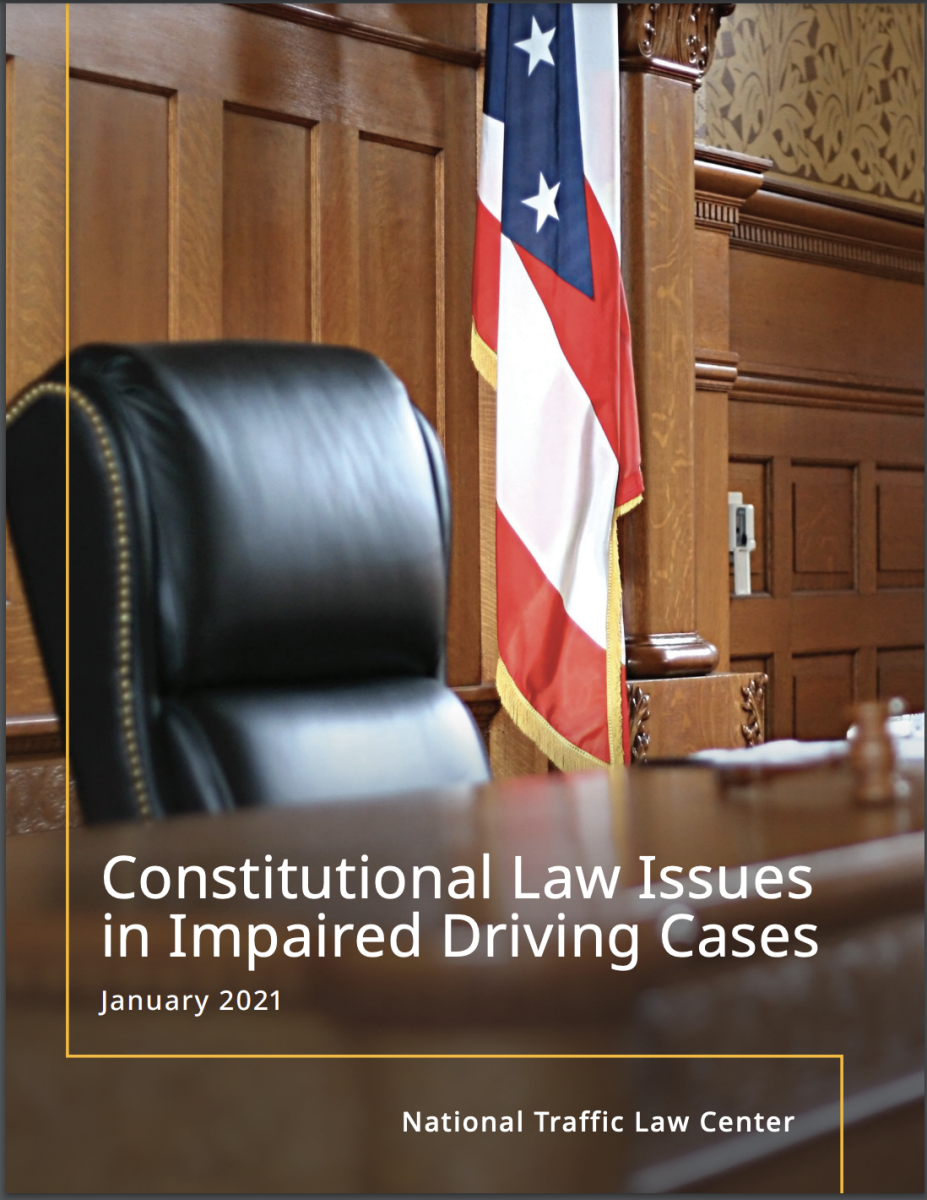 The Constitutional Law Issues in Impaired Driving Cases monograph provides a comprehensive analysis of how the Fourth, Fifth, Sixth, and Fourteenth Amendments apply to impaired driving investigations and prosecutions. It outlines key U.S. Supreme Court decisions affecting searches, seizures, interrogations, right to counsel, confrontation of witnesses, and due process in DUI cases. Designed as a legal reference for prosecutors and law enforcement, it emphasizes the importance of understanding constitutional protections and procedural requirements to ensure fair trials and effective enforcement. The Constitutional Law Issues in Impaired Driving Cases monograph provides a comprehensive analysis of how the Fourth, Fifth, Sixth, and Fourteenth Amendments apply to impaired driving investigations and prosecutions. It outlines key U.S. Supreme Court decisions affecting searches, seizures, interrogations, right to counsel, confrontation of witnesses, and due process in DUI cases. Designed as a legal reference for prosecutors and law enforcement, it emphasizes the importance of understanding constitutional protections and procedural requirements to ensure fair trials and effective enforcement.
|
|
Crash Reconstruction Basics for Prosecutors
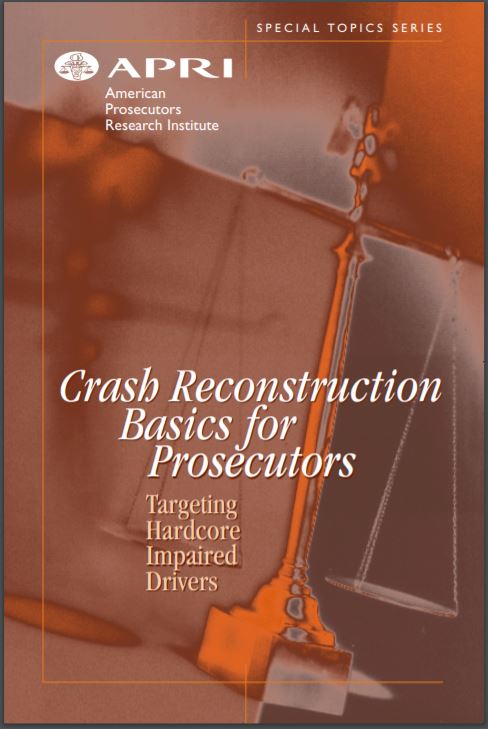 The Crash Reconstruction Basics for Prosecutors guide provides a foundational overview of crash investigation techniques, emphasizing how prosecutors can assess and strengthen cases involving impaired drivers. It covers methods for determining vehicle speed, point of impact, and operator identification using physics-based analyses like energy and momentum calculations, tire mark interpretation, and event data recorder (EDR) data. The publication also offers strategies for challenging defense experts and preparing for trial in vehicular homicide and serious crash cases. The Crash Reconstruction Basics for Prosecutors guide provides a foundational overview of crash investigation techniques, emphasizing how prosecutors can assess and strengthen cases involving impaired drivers. It covers methods for determining vehicle speed, point of impact, and operator identification using physics-based analyses like energy and momentum calculations, tire mark interpretation, and event data recorder (EDR) data. The publication also offers strategies for challenging defense experts and preparing for trial in vehicular homicide and serious crash cases.
|
|
The Criminal Justice System: A Guide for Law Enforcement Officers and Expert Witnesses in Impaired Driving Cases
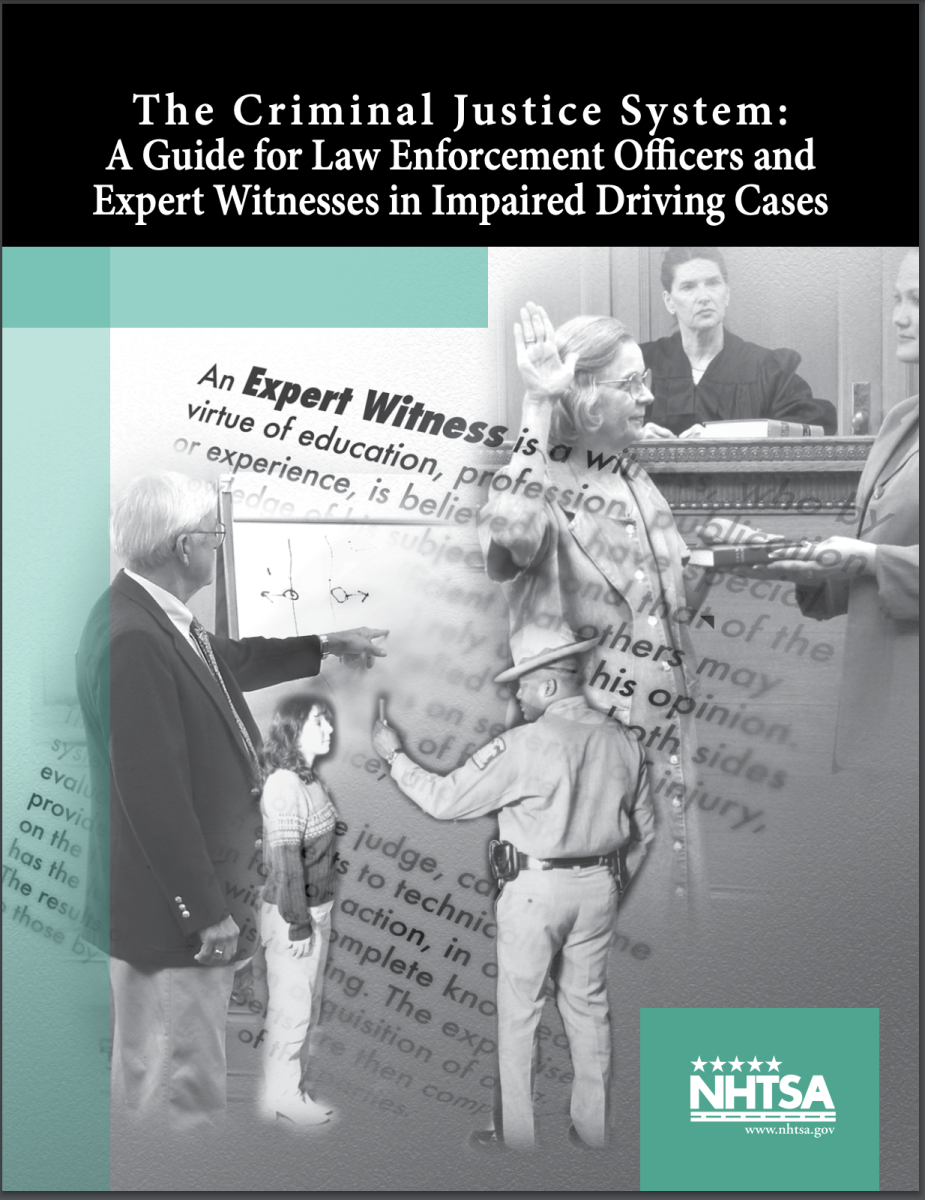 The Expert Witness Guide provides law enforcement officers and scientific experts with a comprehensive overview of their roles in impaired driving cases, including courtroom procedures, testimony preparation, and legal principles. It explains how expert witnesses—such as toxicologists, crash reconstructionists, and drug recognition evaluators—can effectively present complex scientific evidence in understandable terms to judges and juries. The guide also offers practical advice on courtroom conduct, cross-examination, and avoiding common pitfalls to ensure credible and impactful testimony. The Expert Witness Guide provides law enforcement officers and scientific experts with a comprehensive overview of their roles in impaired driving cases, including courtroom procedures, testimony preparation, and legal principles. It explains how expert witnesses—such as toxicologists, crash reconstructionists, and drug recognition evaluators—can effectively present complex scientific evidence in understandable terms to judges and juries. The guide also offers practical advice on courtroom conduct, cross-examination, and avoiding common pitfalls to ensure credible and impactful testimony.
|
|
Cross-Examination for Prosecutors
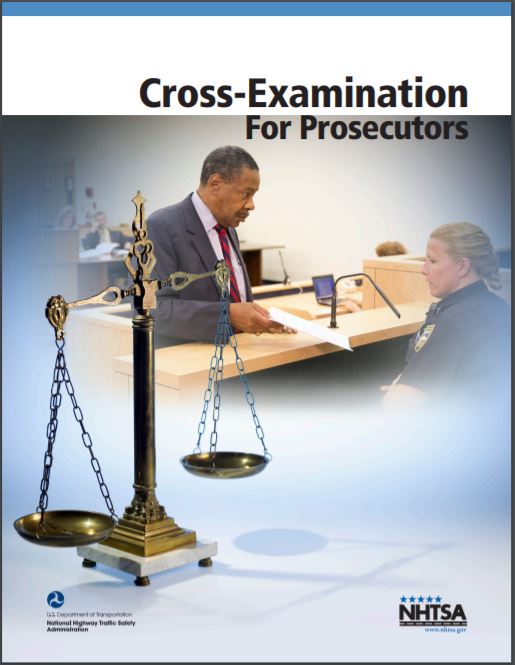 The Cross-Examination for Prosecutors guide offers comprehensive strategies for effectively questioning defense witnesses, especially in impaired driving cases. It emphasizes preparation, understanding defense tactics, and using cross-examination to reinforce the prosecution’s case, gain concessions, and impeach witness credibility. Special attention is given to handling expert witnesses, including researching their background, challenging their qualifications, and exposing weaknesses in their testimony through structured, purposeful questioning. The Cross-Examination for Prosecutors guide offers comprehensive strategies for effectively questioning defense witnesses, especially in impaired driving cases. It emphasizes preparation, understanding defense tactics, and using cross-examination to reinforce the prosecution’s case, gain concessions, and impeach witness credibility. Special attention is given to handling expert witnesses, including researching their background, challenging their qualifications, and exposing weaknesses in their testimony through structured, purposeful questioning.
|
|
Distracted Driving CDL Enforcement for Prosecutors and Law Enforcement
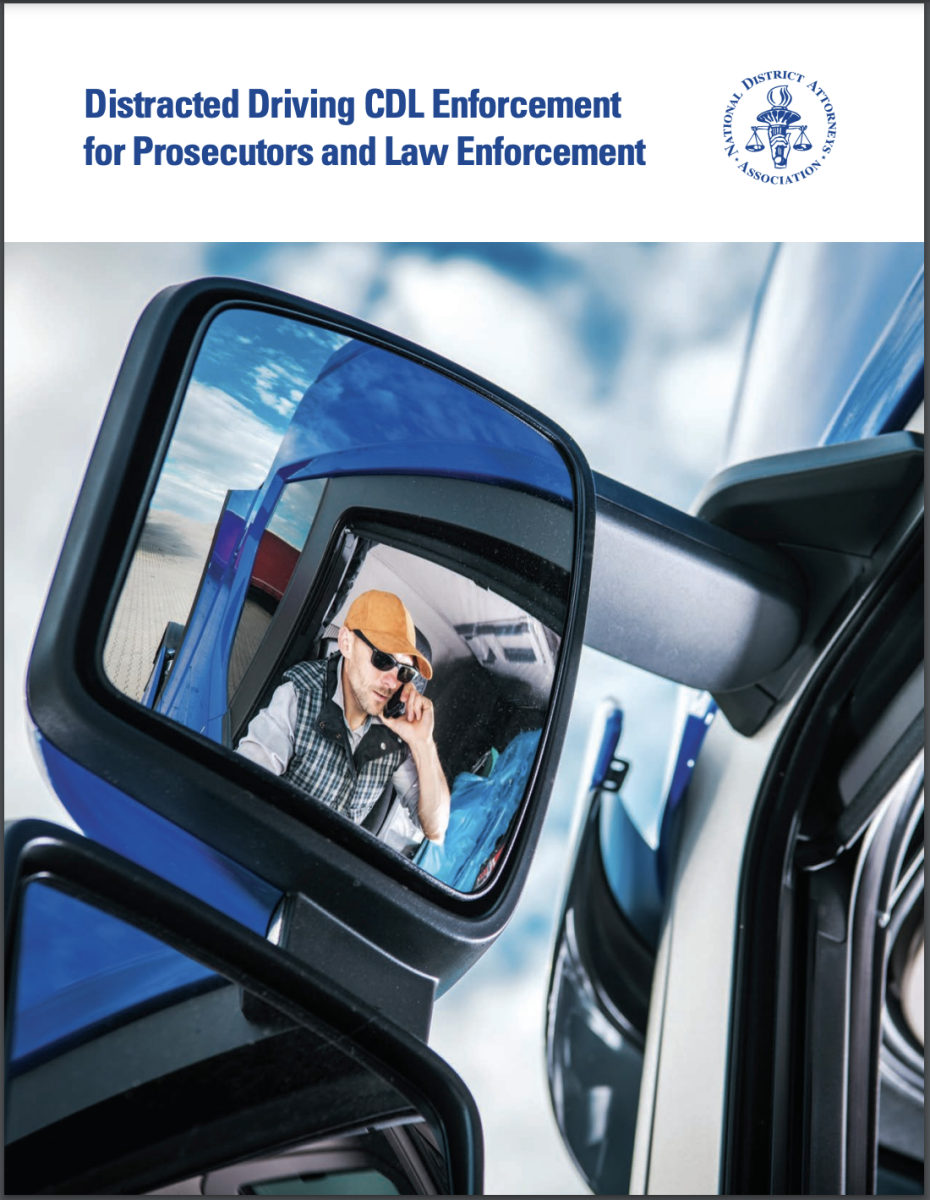 The Distracted Driving CDL Enforcement for Prosecutors and Law Enforcement guide provides a comprehensive overview of how distracted driving impacts commercial motor vehicle (CMV) operators and outlines strategies for enforcement and prosecution. It emphasizes the heightened risks posed by distracted CDL holders due to the size and weight of CMVs, and details investigative techniques, legal standards, and evidentiary considerations for both non-fatal and fatal crashes. The guide also highlights the importance of expert testimony, proper documentation, and victim communication to ensure accountability and justice in distracted driving cases involving commercial drivers. The Distracted Driving CDL Enforcement for Prosecutors and Law Enforcement guide provides a comprehensive overview of how distracted driving impacts commercial motor vehicle (CMV) operators and outlines strategies for enforcement and prosecution. It emphasizes the heightened risks posed by distracted CDL holders due to the size and weight of CMVs, and details investigative techniques, legal standards, and evidentiary considerations for both non-fatal and fatal crashes. The guide also highlights the importance of expert testimony, proper documentation, and victim communication to ensure accountability and justice in distracted driving cases involving commercial drivers.
|
|
The Drug Evaluation and Classification (DEC) Program
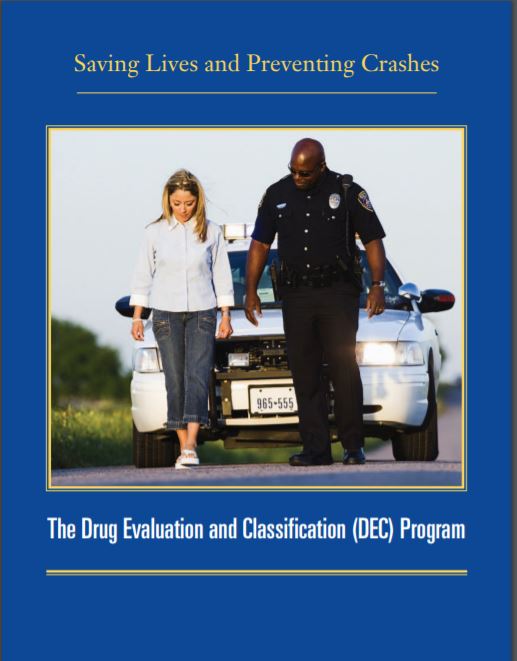 The Drug Evaluation and Classification (DEC) Program provides an overview of this nationally recognized initiative and provides prosecutors with a basic understanding of the training law enforcement officers undergo to identify drug-impaired drivers and the standardized 12-step evaluation process the officers use. The guide highlights the extensive scientific research and legal precedent supporting the program and how it enhances impaired driving enforcement and prosecution, contributing significantly to traffic safety and public health. The Drug Evaluation and Classification (DEC) Program provides an overview of this nationally recognized initiative and provides prosecutors with a basic understanding of the training law enforcement officers undergo to identify drug-impaired drivers and the standardized 12-step evaluation process the officers use. The guide highlights the extensive scientific research and legal precedent supporting the program and how it enhances impaired driving enforcement and prosecution, contributing significantly to traffic safety and public health.
|
|
Drug Toxicology for Prosecutors
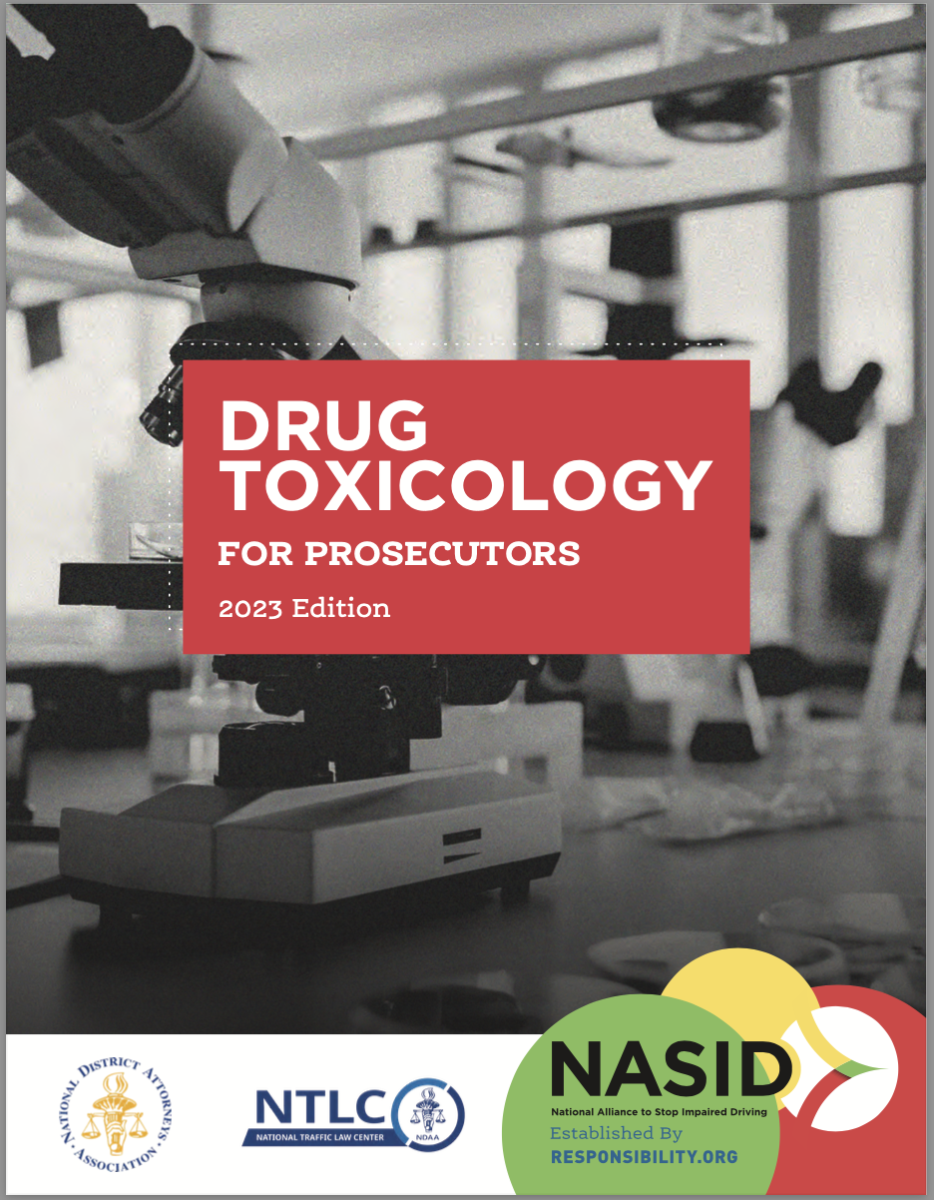 The 2023 edition of Drug Toxicology for Prosecutors provides updated guidance on handling drug-impaired driving cases, emphasizing the complexities of interpreting toxicology results and the importance of understanding pharmacology, specimen types, and laboratory practices. It highlights the challenges posed by novel psychoactive substances, polysubstance use, and individual variability in drug effects, and stresses the need for collaboration between prosecutors and toxicologists to build strong cases. The monograph also outlines best practices for expert testimony and offers resources to help prosecutors effectively present scientific evidence in court. The 2023 edition of Drug Toxicology for Prosecutors provides updated guidance on handling drug-impaired driving cases, emphasizing the complexities of interpreting toxicology results and the importance of understanding pharmacology, specimen types, and laboratory practices. It highlights the challenges posed by novel psychoactive substances, polysubstance use, and individual variability in drug effects, and stresses the need for collaboration between prosecutors and toxicologists to build strong cases. The monograph also outlines best practices for expert testimony and offers resources to help prosecutors effectively present scientific evidence in court.
|
|
DWI Prosecutor’s Handbook
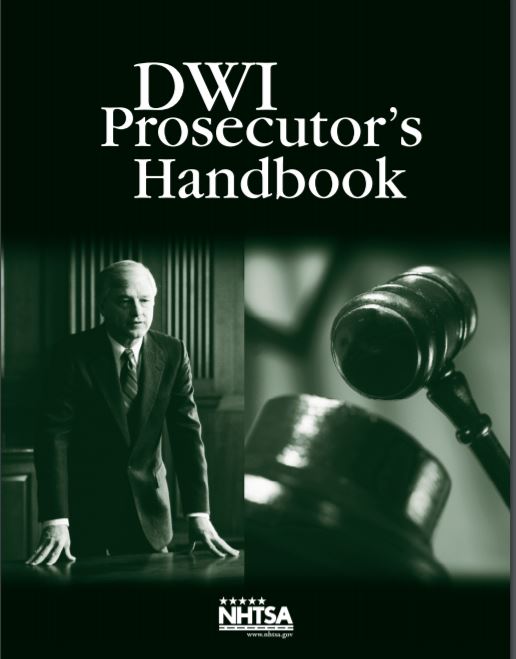 The DWI Prosecutors Handbook is a comprehensive guide designed to assist prosecutors in effectively handling driving while intoxicated (DWI) cases. It covers every stage of prosecution—from case review and evidence collection to trial preparation and witness management—emphasizing the importance of understanding legal procedures, forensic evidence, and common defense strategies. The handbook also provides practical tools, such as checklists, timelines, and expert guidance, to help prosecutors build strong cases and support victims throughout the legal process. The DWI Prosecutors Handbook is a comprehensive guide designed to assist prosecutors in effectively handling driving while intoxicated (DWI) cases. It covers every stage of prosecution—from case review and evidence collection to trial preparation and witness management—emphasizing the importance of understanding legal procedures, forensic evidence, and common defense strategies. The handbook also provides practical tools, such as checklists, timelines, and expert guidance, to help prosecutors build strong cases and support victims throughout the legal process.
|
|
Hardcore Drunk Driving Prosecutorial Guide: A Resource Outlining Prosecutorial Challenges, Effective Strategies and Model Programs
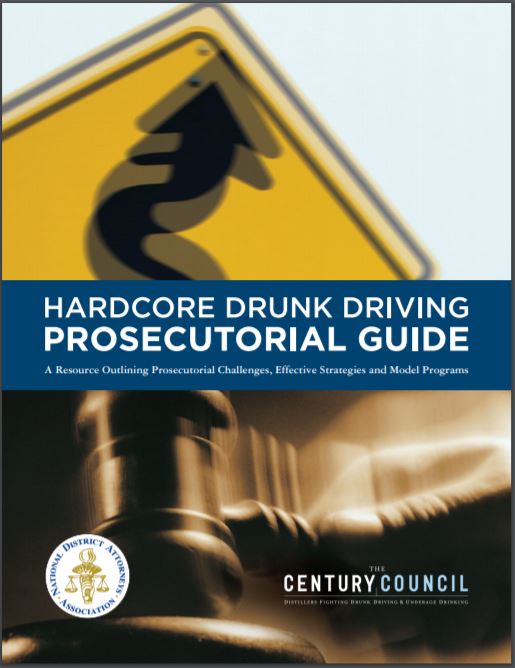 The Hardcore Drunk Driving Prosecutorial Guide provides prosecutors with strategies to identify, prosecute, and reduce recidivism among high-risk offenders—those with high blood alcohol levels, repeat offenses, and resistance to change. It emphasizes a multidisciplinary approach involving courts, law enforcement, probation, treatment providers, and public engagement, and outlines effective sanctions such as ignition interlocks, staggered sentencing, and intensive supervision. The guide advocates for individualized case management and comprehensive sentencing to promote behavioral change and enhance public safety. The Hardcore Drunk Driving Prosecutorial Guide provides prosecutors with strategies to identify, prosecute, and reduce recidivism among high-risk offenders—those with high blood alcohol levels, repeat offenses, and resistance to change. It emphasizes a multidisciplinary approach involving courts, law enforcement, probation, treatment providers, and public engagement, and outlines effective sanctions such as ignition interlocks, staggered sentencing, and intensive supervision. The guide advocates for individualized case management and comprehensive sentencing to promote behavioral change and enhance public safety.
|
|
Horizontal Gaze Nystagmus—The Science and the Law: A Resource Guide for Judges, Prosecutors and Law Enforcement
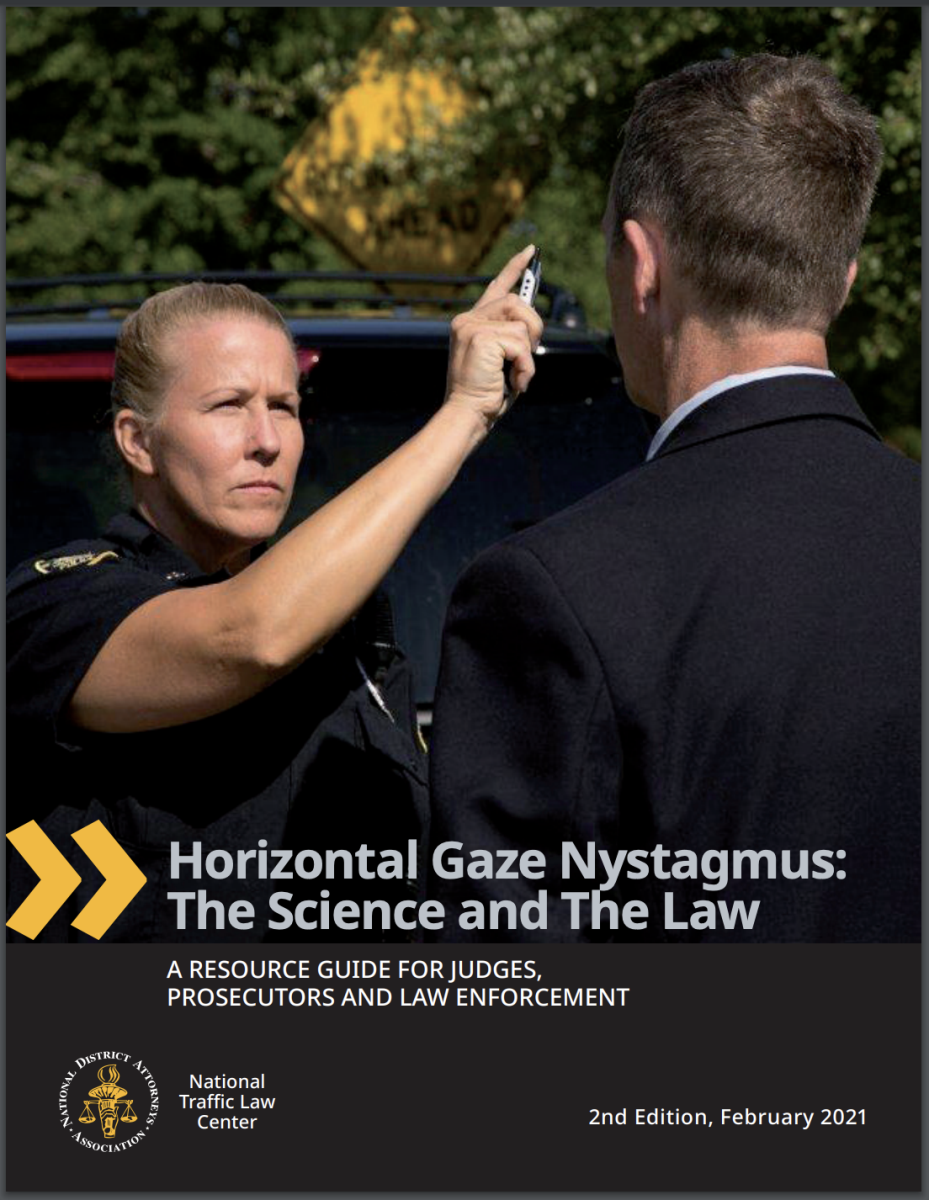 Designed especially to assist judges, prosecutors and law enforcement personnel, this guide explains the physiological basis and legal admissibility of the HGN test, a key component of standardized field sobriety testing used to detect alcohol impairment. It details how alcohol and certain drugs affect eye movements, outlines proper test administration, and provides scientific validation and courtroom strategies for prosecutors and law enforcement. The guide emphasizes HGN’s reliability and utility in impaired driving cases, offering extensive resources to support its use in legal proceedings. Designed especially to assist judges, prosecutors and law enforcement personnel, this guide explains the physiological basis and legal admissibility of the HGN test, a key component of standardized field sobriety testing used to detect alcohol impairment. It details how alcohol and certain drugs affect eye movements, outlines proper test administration, and provides scientific validation and courtroom strategies for prosecutors and law enforcement. The guide emphasizes HGN’s reliability and utility in impaired driving cases, offering extensive resources to support its use in legal proceedings.
|
|
Hospitals, HIPAA, and Impaired Driving Cases—A Guide for Law Enforcement and Prosecutors
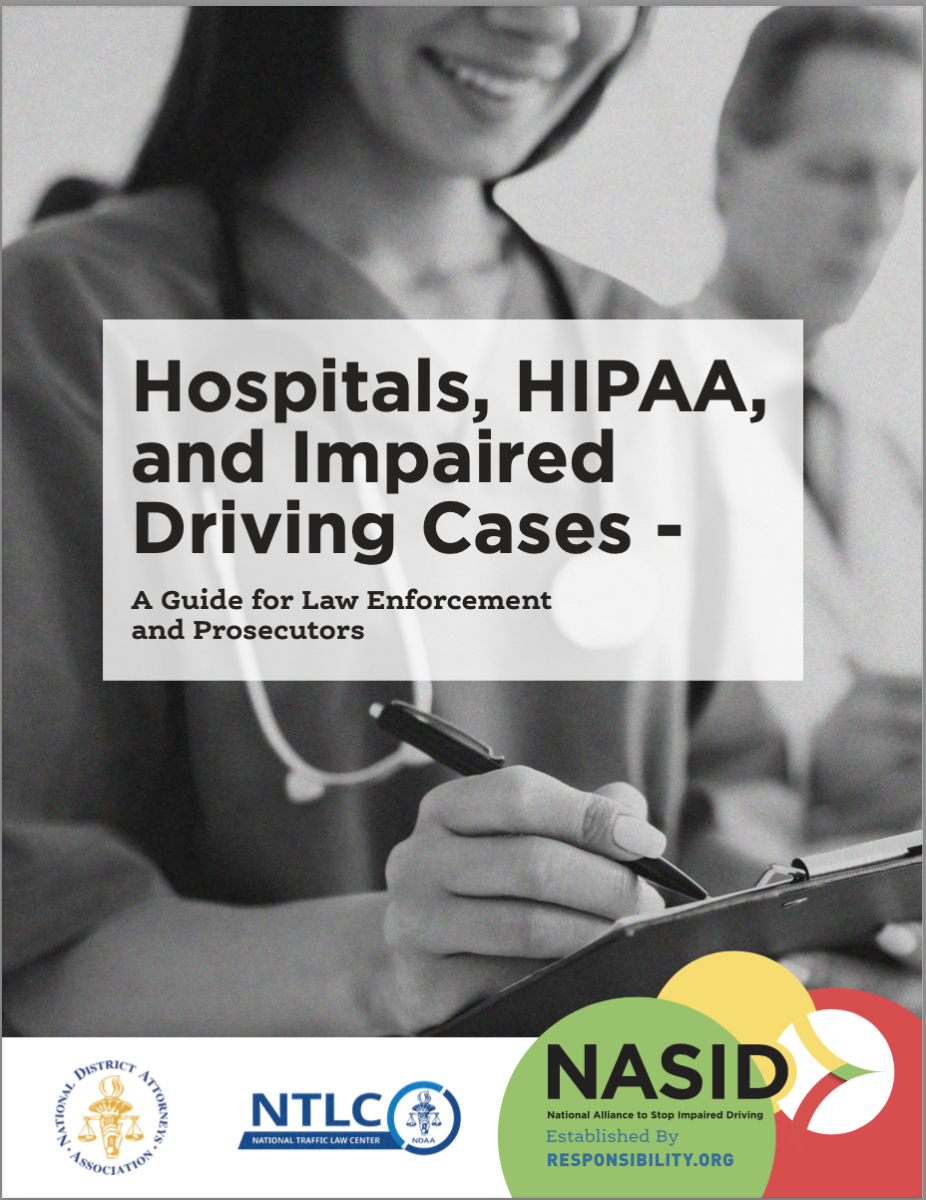 The guide Hospitals, HIPAA, and Impaired Driving Cases helps law enforcement and prosecutors navigate the legal and procedural challenges of obtaining medical evidence from hospitals in impaired driving investigations. It clarifies how HIPAA applies to criminal cases, outlines permissible disclosures of protected health information, and emphasizes the importance of building cooperative relationships with hospital personnel. The guide also offers strategies to streamline evidence collection, including law enforcement phlebotomy programs and memorandums of understanding, to improve prosecution outcomes while minimizing courtroom appearances by medical staff. The guide Hospitals, HIPAA, and Impaired Driving Cases helps law enforcement and prosecutors navigate the legal and procedural challenges of obtaining medical evidence from hospitals in impaired driving investigations. It clarifies how HIPAA applies to criminal cases, outlines permissible disclosures of protected health information, and emphasizes the importance of building cooperative relationships with hospital personnel. The guide also offers strategies to streamline evidence collection, including law enforcement phlebotomy programs and memorandums of understanding, to improve prosecution outcomes while minimizing courtroom appearances by medical staff.
|
|
Investigation and Prosecution of Cannabis-Impaired Driving Cases
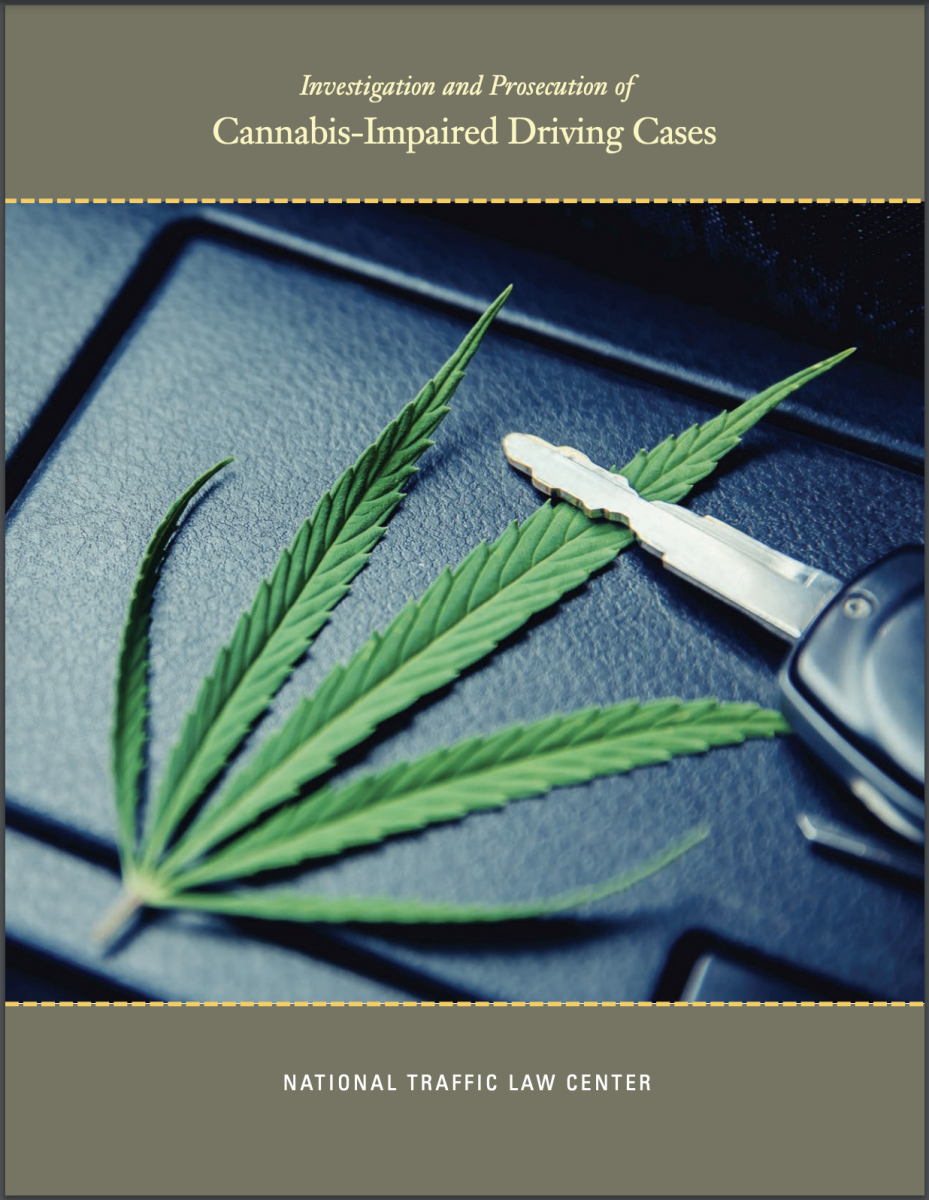 The guide Investigation and Prosecution of Cannabis-Impaired Driving Cases offers a comprehensive framework for law enforcement and prosecutors to address the growing challenge of cannabis-impaired driving. It details the physiological effects of cannabis, investigative tools like SFSTs and DRE evaluations, and legal considerations including search warrants and evidentiary standards. Emphasizing training, documentation, and expert collaboration, the guide also provides strategies for courtroom preparation, handling defenses, and educating jurors on cannabis impairment. The guide Investigation and Prosecution of Cannabis-Impaired Driving Cases offers a comprehensive framework for law enforcement and prosecutors to address the growing challenge of cannabis-impaired driving. It details the physiological effects of cannabis, investigative tools like SFSTs and DRE evaluations, and legal considerations including search warrants and evidentiary standards. Emphasizing training, documentation, and expert collaboration, the guide also provides strategies for courtroom preparation, handling defenses, and educating jurors on cannabis impairment.
|
|
Investigation and Prosecution of Distracted Driving Cases
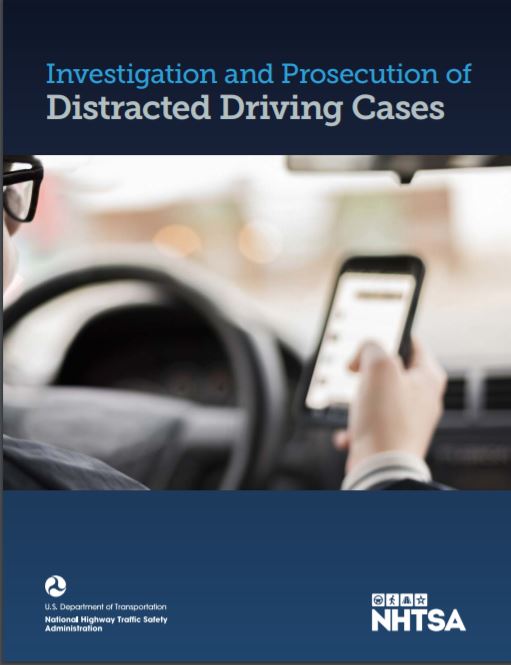 The Investigation and Prosecution of Distracted Driving Cases guide outlines the dangers of distracted driving, emphasizing its role in thousands of injuries and fatalities annually. It categorizes distractions into visual, manual, cognitive, and combination types, and provides strategies for law enforcement and prosecutors to detect, investigate, and prosecute such cases effectively. The guide also highlights the importance of high-visibility enforcement, thorough evidence collection (including digital and testimonial), and clear courtroom presentation to hold distracted drivers accountable. The Investigation and Prosecution of Distracted Driving Cases guide outlines the dangers of distracted driving, emphasizing its role in thousands of injuries and fatalities annually. It categorizes distractions into visual, manual, cognitive, and combination types, and provides strategies for law enforcement and prosecutors to detect, investigate, and prosecute such cases effectively. The guide also highlights the importance of high-visibility enforcement, thorough evidence collection (including digital and testimonial), and clear courtroom presentation to hold distracted drivers accountable.
|
|
Jury Selection in Impaired Driving Cases
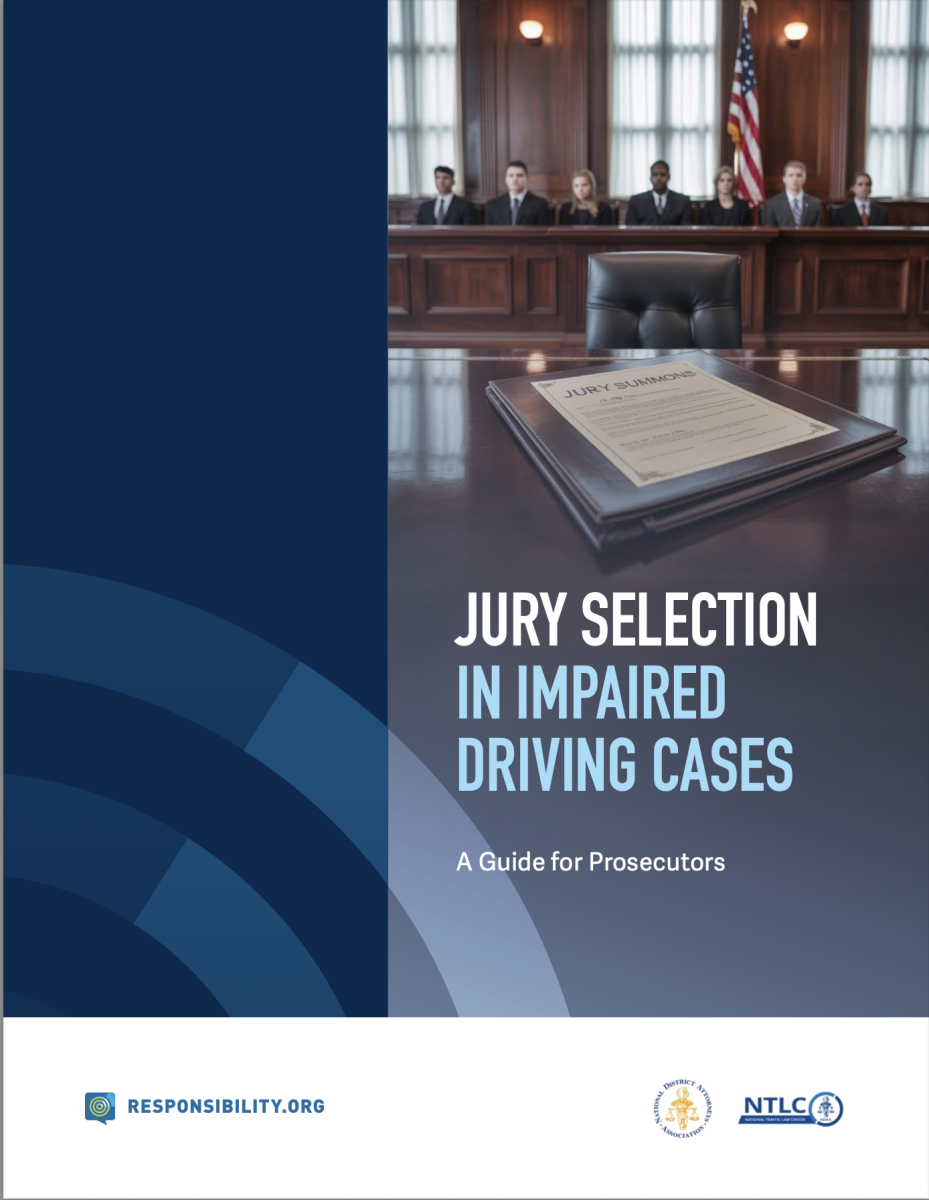 The Jury Selection in Impaired Driving Cases: A Guide for Prosecutors provides prosecutors with practical strategies for conducting effective voir dire in impaired driving trials. It emphasizes the importance of identifying juror biases, building rapport, and educating jurors on legal standards and evidence types, especially in cases involving alcohol, drugs, or prescription medications. The guide also offers sample questions, personality-based juror assessments, and professional considerations to help prosecutors select fair and impartial juries capable of rendering just verdicts. The Jury Selection in Impaired Driving Cases: A Guide for Prosecutors provides prosecutors with practical strategies for conducting effective voir dire in impaired driving trials. It emphasizes the importance of identifying juror biases, building rapport, and educating jurors on legal standards and evidence types, especially in cases involving alcohol, drugs, or prescription medications. The guide also offers sample questions, personality-based juror assessments, and professional considerations to help prosecutors select fair and impartial juries capable of rendering just verdicts.
|
|
Large Truck Crash Reconstruction for Prosecutors
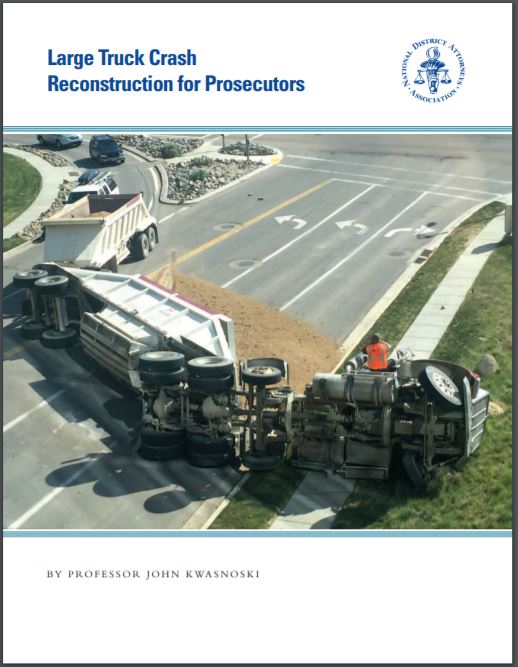 The Large Truck Crash Reconstruction for Prosecutors guide provides a comprehensive overview of the unique dynamics and investigative considerations involved in commercial motor vehicle (CMV) crashes. It explains how CMV collisions differ from car crashes due to factors like vehicle weight, braking systems, driver visibility, and electronic data recording. The guide equips prosecutors with technical knowledge and reconstruction methodologies to assess driver culpability, interpret crash evidence, and understand federal regulations affecting commercial drivers. The Large Truck Crash Reconstruction for Prosecutors guide provides a comprehensive overview of the unique dynamics and investigative considerations involved in commercial motor vehicle (CMV) crashes. It explains how CMV collisions differ from car crashes due to factors like vehicle weight, braking systems, driver visibility, and electronic data recording. The guide equips prosecutors with technical knowledge and reconstruction methodologies to assess driver culpability, interpret crash evidence, and understand federal regulations affecting commercial drivers.
|
|
Lyft Correlation Studies--California
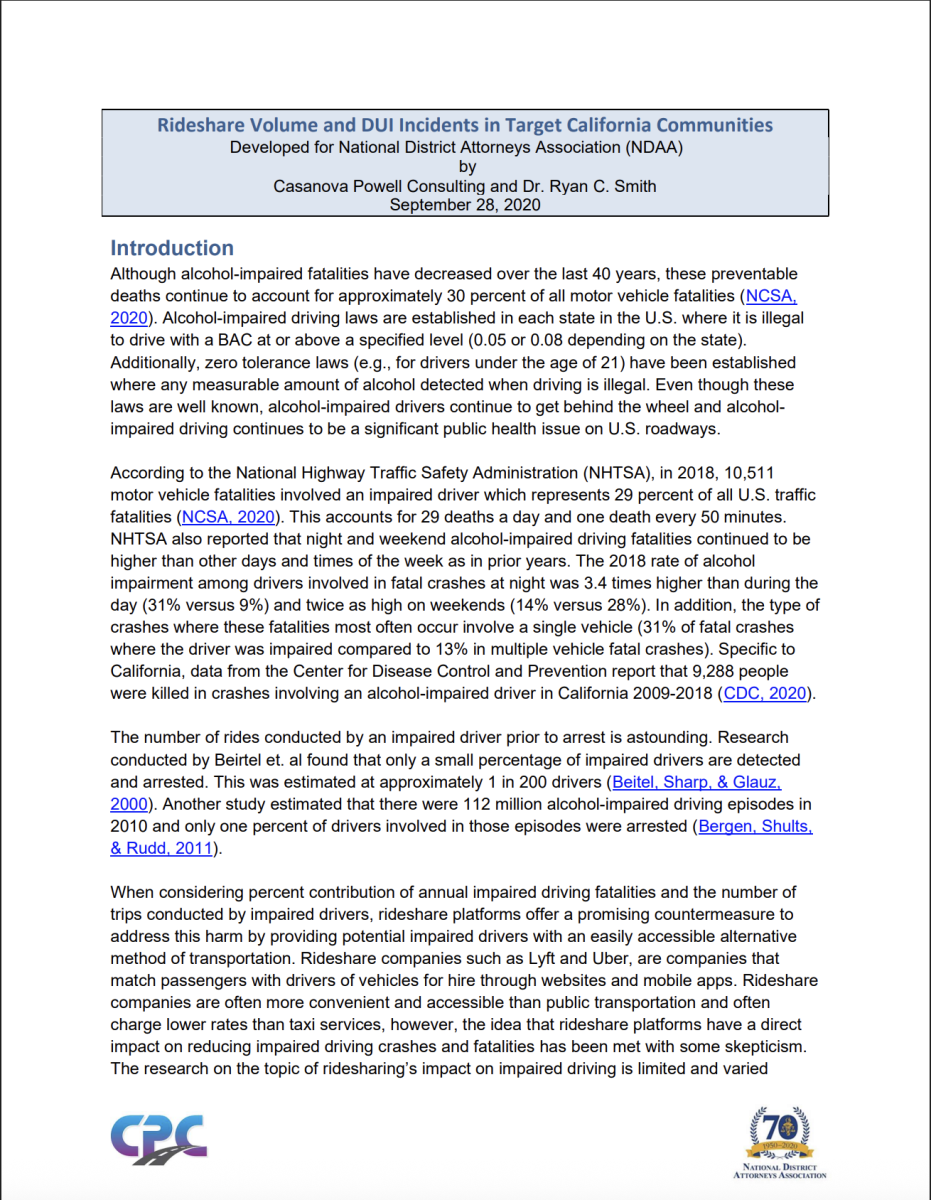 This NDAA-Lyft California report examines the relationship between rideshare volume and DUI incidents in Los Angeles, San Diego, and San Francisco. The study found significant reductions in DUI charges, arrests, and bookings following the introduction of rideshare—39.6% in Los Angeles, 24.7% in San Diego, and 31% in San Francisco—alongside strong negative correlations between rideshare volume and DUI outcomes in Los Angeles and San Diego. While the study does not establish causation, it supports the hypothesis that ridesharing may contribute to improved traffic safety and reduced impaired driving. This NDAA-Lyft California report examines the relationship between rideshare volume and DUI incidents in Los Angeles, San Diego, and San Francisco. The study found significant reductions in DUI charges, arrests, and bookings following the introduction of rideshare—39.6% in Los Angeles, 24.7% in San Diego, and 31% in San Francisco—alongside strong negative correlations between rideshare volume and DUI outcomes in Los Angeles and San Diego. While the study does not establish causation, it supports the hypothesis that ridesharing may contribute to improved traffic safety and reduced impaired driving.
|
|
Lyft Correlation Studies--Atlanta et al.
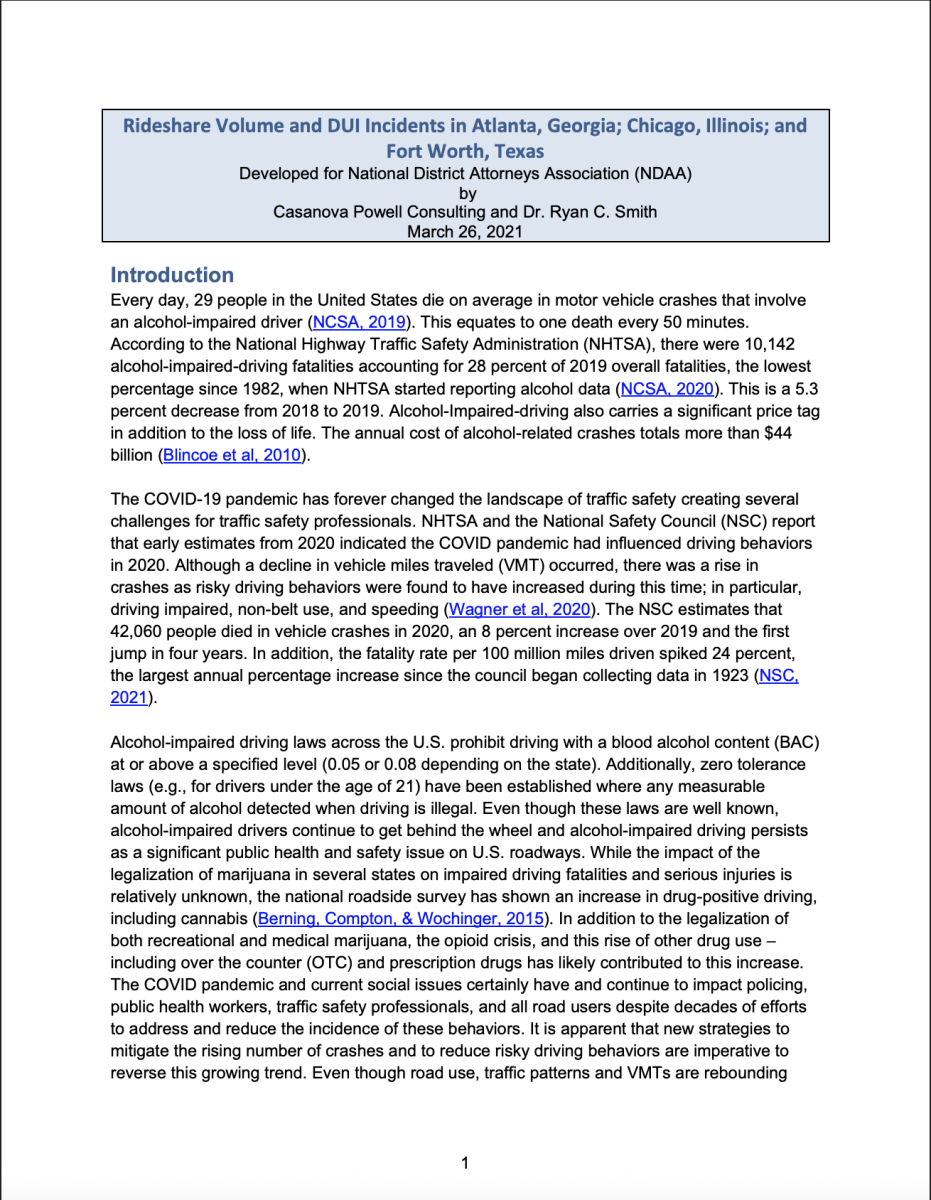 This NDAA-Lyft Atlanta et al. report analyzes the relationship between rideshare volume and DUI incidents in Atlanta, Chicago, and Fort Worth. Across all three cities, the study found a consistent decrease in DUI arrests, crashes, and fatalities following the introduction of rideshare, with statistically significant reductions in DUI charges in Atlanta and Chicago. While the study does not establish causation, it supports the hypothesis that ridesharing services may contribute to improved traffic safety and reduced impaired driving outcomes. This NDAA-Lyft Atlanta et al. report analyzes the relationship between rideshare volume and DUI incidents in Atlanta, Chicago, and Fort Worth. Across all three cities, the study found a consistent decrease in DUI arrests, crashes, and fatalities following the introduction of rideshare, with statistically significant reductions in DUI charges in Atlanta and Chicago. While the study does not establish causation, it supports the hypothesis that ridesharing services may contribute to improved traffic safety and reduced impaired driving outcomes.
|
|
Lyft Correlation Studies--Massachusetts
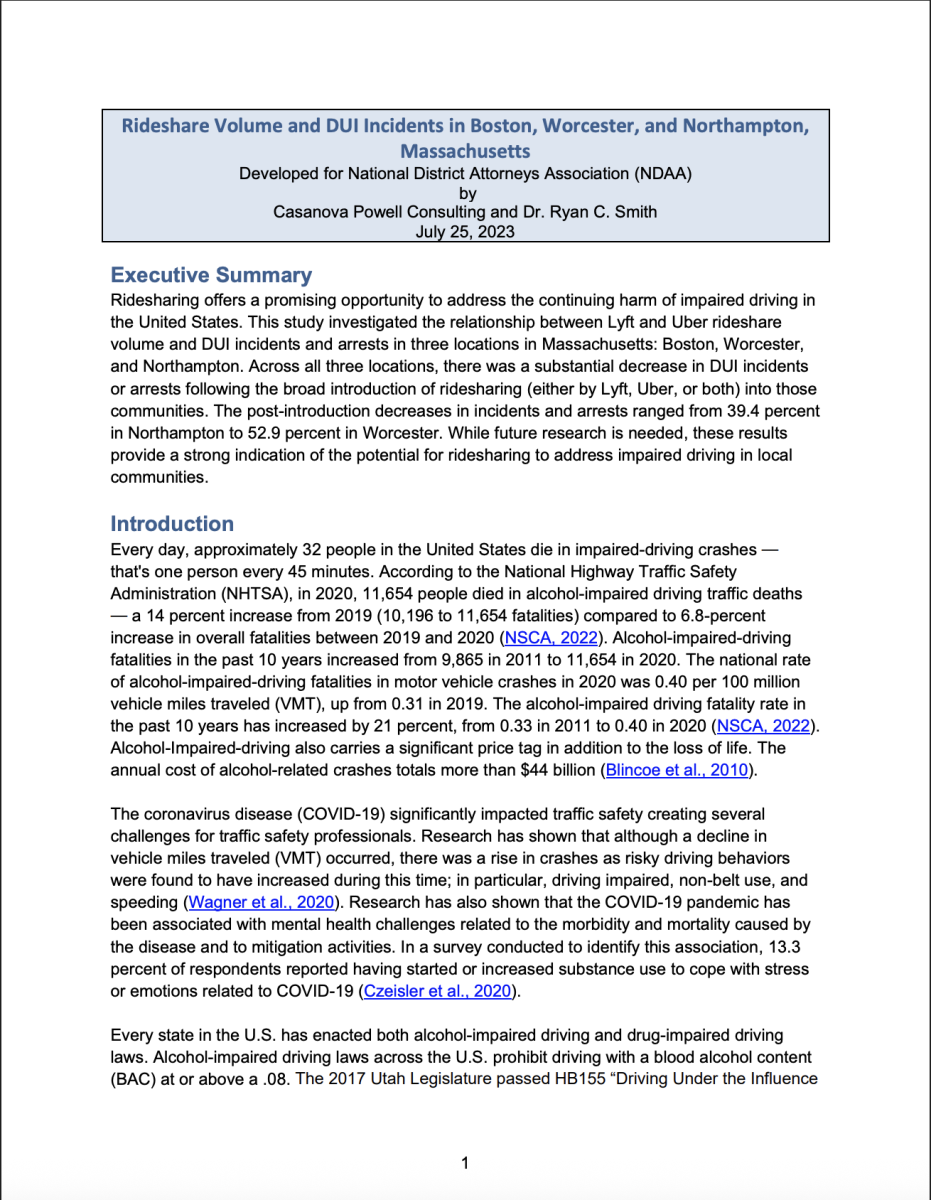 This NDAA-Lyft report on Massachusetts analyzes the relationship between rideshare volume and DUI incidents in Boston, Worcester, and Northampton. The study found consistent and substantial decreases in DUI arrests or incidents—ranging from 39.4% to 52.9%—following the introduction of ridesharing services in each city. While not establishing causation, the findings suggest ridesharing may be a valuable tool in reducing impaired driving and improving traffic safety. This NDAA-Lyft report on Massachusetts analyzes the relationship between rideshare volume and DUI incidents in Boston, Worcester, and Northampton. The study found consistent and substantial decreases in DUI arrests or incidents—ranging from 39.4% to 52.9%—following the introduction of ridesharing services in each city. While not establishing causation, the findings suggest ridesharing may be a valuable tool in reducing impaired driving and improving traffic safety.
|
|
Masking Quick Reference Guide
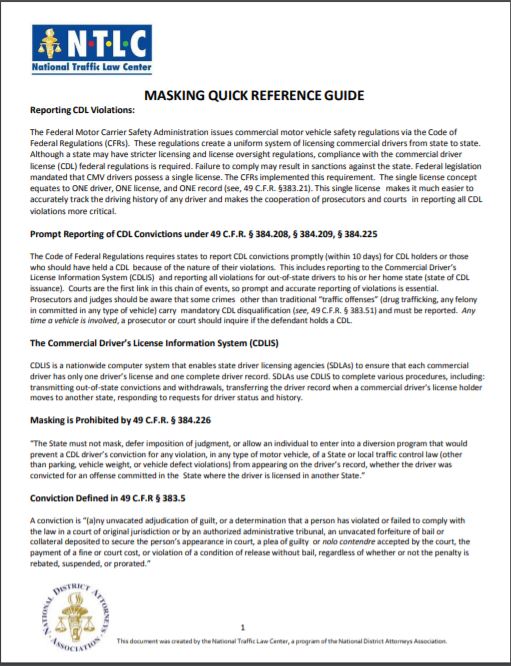 The Masking Quick Reference Guide explains the federal prohibition against "masking" convictions for commercial driver's license (CDL) holders, which includes deferring, diverting, or amending traffic violations to avoid proper reporting. It outlines specific examples of prosecutorial and judicial actions that constitute masking, emphasizing that all CDL-related convictions must be accurately reported to maintain safety and compliance with federal regulations. The guide serves as a resource for prosecutors and courts to ensure transparency and accountability in CDL violation handling. The Masking Quick Reference Guide explains the federal prohibition against "masking" convictions for commercial driver's license (CDL) holders, which includes deferring, diverting, or amending traffic violations to avoid proper reporting. It outlines specific examples of prosecutorial and judicial actions that constitute masking, emphasizing that all CDL-related convictions must be accurately reported to maintain safety and compliance with federal regulations. The guide serves as a resource for prosecutors and courts to ensure transparency and accountability in CDL violation handling.
|
|
NJC CDL/CMV Disqualification Benchcard
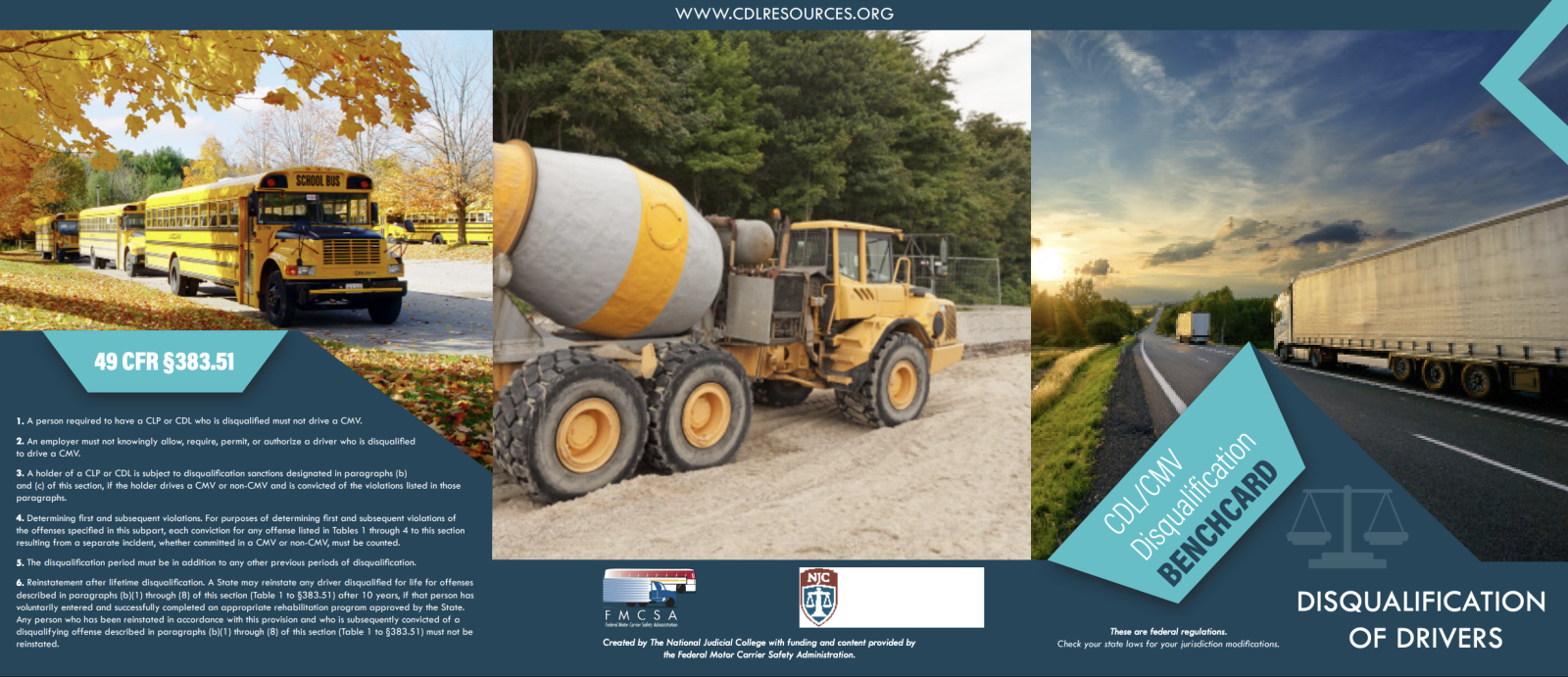 The NJC CDL Disqualification Benchcard summarizes federal regulations under 49 CFR §383.51 regarding disqualifications for commercial drivers based on specific offenses. It outlines mandatory disqualification periods for violations such as DUI, drug offenses, reckless driving, and railroad crossing infractions, emphasizing that both CMV and non-CMV convictions can impact a CDL holder’s eligibility to operate a commercial vehicle. The NJC CDL Disqualification Benchcard summarizes federal regulations under 49 CFR §383.51 regarding disqualifications for commercial drivers based on specific offenses. It outlines mandatory disqualification periods for violations such as DUI, drug offenses, reckless driving, and railroad crossing infractions, emphasizing that both CMV and non-CMV convictions can impact a CDL holder’s eligibility to operate a commercial vehicle.
|
|
Overcoming Impaired Driving Defenses
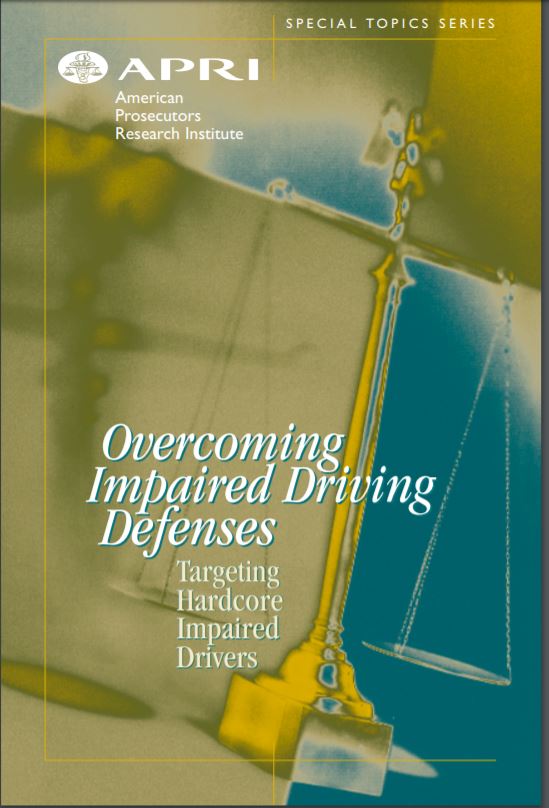 The Overcoming Impaired Driving Defenses guide provides prosecutors with strategies to counter common defense tactics in DUI cases, including challenges to traffic stops, arrests, field sobriety tests, breathalyzer accuracy, and Miranda rights. It emphasizes the importance of preparation, understanding behavioral indicators of impairment, and effectively presenting evidence to juries. The guide also offers practical tips for courtroom responses and highlights additional resources for prosecuting impaired driving cases. The Overcoming Impaired Driving Defenses guide provides prosecutors with strategies to counter common defense tactics in DUI cases, including challenges to traffic stops, arrests, field sobriety tests, breathalyzer accuracy, and Miranda rights. It emphasizes the importance of preparation, understanding behavioral indicators of impairment, and effectively presenting evidence to juries. The guide also offers practical tips for courtroom responses and highlights additional resources for prosecuting impaired driving cases.
|
|
Prior Convictions in Impaired Driving Prosecutions
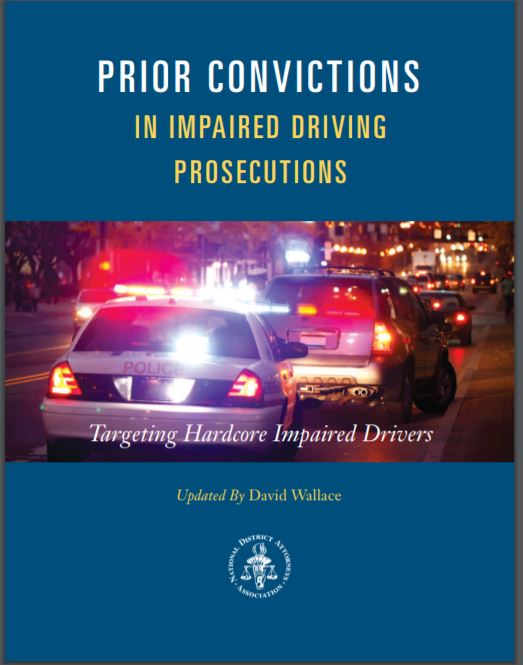 The Prior Convictions guide provides prosecutors with strategies to identify, verify, and use prior impaired driving convictions to enhance current DUI charges. It covers sources for locating past convictions, state-specific look-back periods, procedures for admitting prior records in court, and methods for proving the defendant's identity. The guide also addresses common defense tactics, including constitutional challenges, and offers practical tips for navigating both direct and collateral attacks on prior convictions. The Prior Convictions guide provides prosecutors with strategies to identify, verify, and use prior impaired driving convictions to enhance current DUI charges. It covers sources for locating past convictions, state-specific look-back periods, procedures for admitting prior records in court, and methods for proving the defendant's identity. The guide also addresses common defense tactics, including constitutional challenges, and offers practical tips for navigating both direct and collateral attacks on prior convictions.
|
|
Prosecutors Working with Victim Advocate Groups
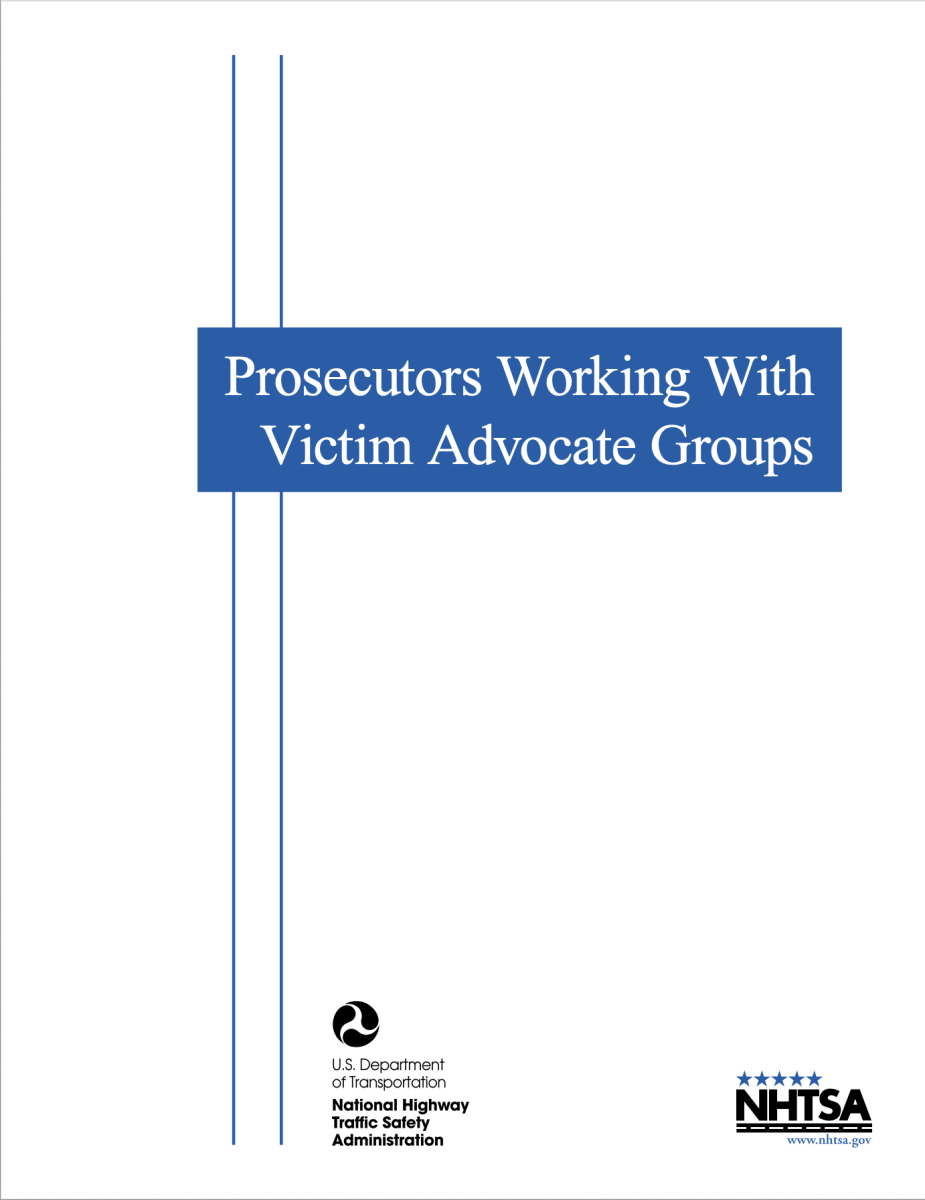 Prosecutors Working With Victim Advocate Groups is a comprehensive guide developed with the assistance of Mothers Against Drunk Driving (MADD) to help prosecutors collaborate effectively with victims and advocacy organizations, especially in impaired-driving cases. It emphasizes the importance of treating victims with compassion, providing them with information and support, and involving them meaningfully in the justice process. The guide also outlines best practices, model programs, and resources to foster office-wide victim-centered policies and build strong community partnerships. Prosecutors Working With Victim Advocate Groups is a comprehensive guide developed with the assistance of Mothers Against Drunk Driving (MADD) to help prosecutors collaborate effectively with victims and advocacy organizations, especially in impaired-driving cases. It emphasizes the importance of treating victims with compassion, providing them with information and support, and involving them meaningfully in the justice process. The guide also outlines best practices, model programs, and resources to foster office-wide victim-centered policies and build strong community partnerships.
|
|
TSRP Manual 3rd Edition (2024)
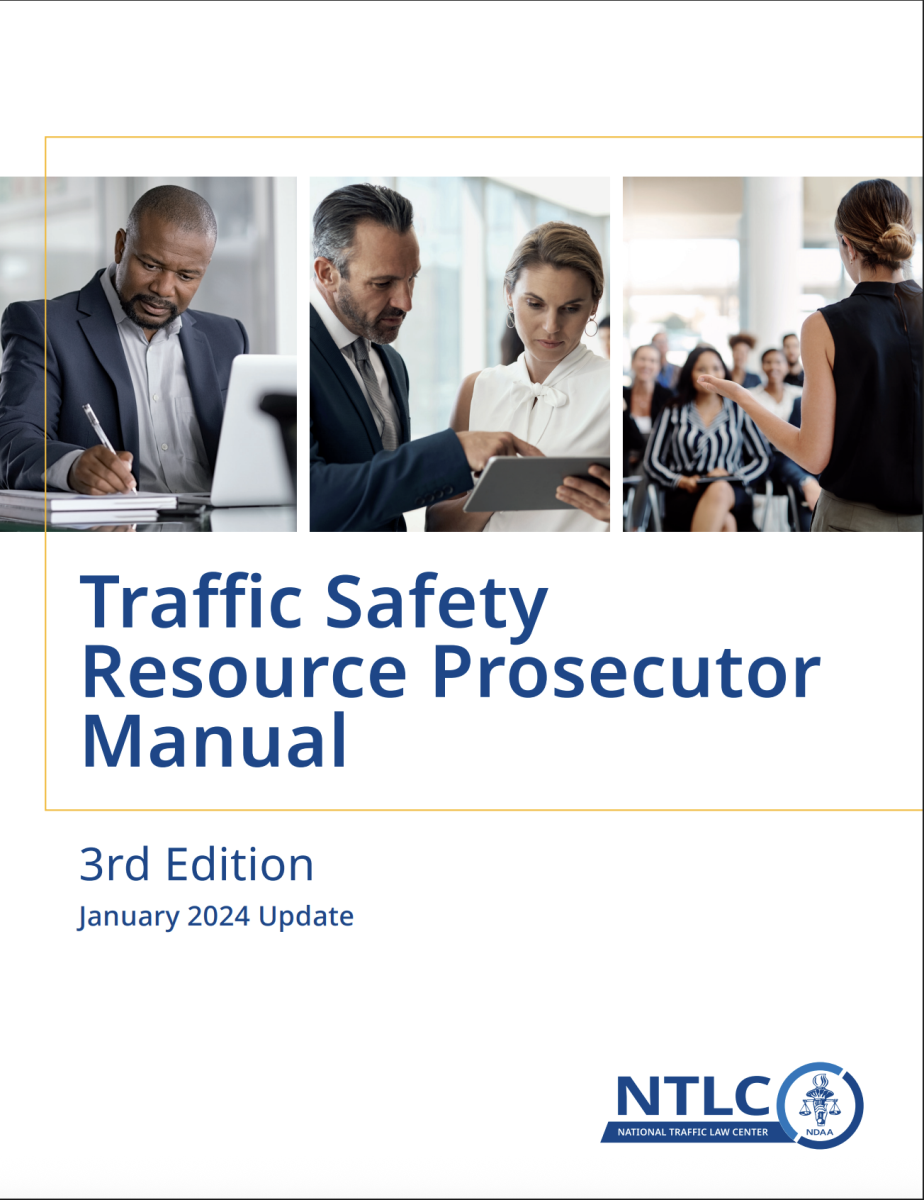 The Traffic Safety Resource Prosecutor (TSRP) Manual, 3rd Edition serves as a comprehensive guide for TSRPs, outlining their role in supporting prosecutors and law enforcement with training, technical assistance, and legislative education related to traffic safety and impaired driving cases. It details best practices for building partnerships, developing training programs, managing resources, and navigating legal and administrative challenges. The manual also introduces the complementary role of Traffic Safety Resource Investigators (TSRIs) and highlights the resources available through the National Traffic Law Center (NTLC). The Traffic Safety Resource Prosecutor (TSRP) Manual, 3rd Edition serves as a comprehensive guide for TSRPs, outlining their role in supporting prosecutors and law enforcement with training, technical assistance, and legislative education related to traffic safety and impaired driving cases. It details best practices for building partnerships, developing training programs, managing resources, and navigating legal and administrative challenges. The manual also introduces the complementary role of Traffic Safety Resource Investigators (TSRIs) and highlights the resources available through the National Traffic Law Center (NTLC).
|

 This guide explores the admissibility of the Horizontal Gaze Nystagmus (HGN) test in DUI prosecutions, emphasizing its scientific validity and reliability as a field sobriety test. It outlines the foundational legal hurdles prosecutors face under standards like Frye and Daubert, and provides strategies for establishing admissibility, including expert testimony and pretrial motions. The publication also highlights the role of optometrists and research supporting HGN's effectiveness, especially in detecting impairment among repeat offenders who may mask other signs of intoxication.
This guide explores the admissibility of the Horizontal Gaze Nystagmus (HGN) test in DUI prosecutions, emphasizing its scientific validity and reliability as a field sobriety test. It outlines the foundational legal hurdles prosecutors face under standards like Frye and Daubert, and provides strategies for establishing admissibility, including expert testimony and pretrial motions. The publication also highlights the role of optometrists and research supporting HGN's effectiveness, especially in detecting impairment among repeat offenders who may mask other signs of intoxication. Alcohol Toxicology for Prosecutors provides prosecutors with a comprehensive guide to alcohol toxicology, focusing on how alcohol is absorbed, distributed, and eliminated in the body, and how these processes affect blood alcohol concentration (BAC). It explains scientific methods like retrograde extrapolation to estimate BAC at the time of driving, counter common defenses such as post-incident drinking or rising BAC claims, and interpret various types of test results. The guide emphasizes using expert testimony and scientific principles to strengthen DUI cases, especially against repeat offenders.
Alcohol Toxicology for Prosecutors provides prosecutors with a comprehensive guide to alcohol toxicology, focusing on how alcohol is absorbed, distributed, and eliminated in the body, and how these processes affect blood alcohol concentration (BAC). It explains scientific methods like retrograde extrapolation to estimate BAC at the time of driving, counter common defenses such as post-incident drinking or rising BAC claims, and interpret various types of test results. The guide emphasizes using expert testimony and scientific principles to strengthen DUI cases, especially against repeat offenders. Basic Trial Techniques for Prosecutors is a comprehensive guide for prosecutors handling impaired driving cases, offering practical strategies for every stage of trial—from pre-trial preparation and jury selection to opening statements, witness examination, and closing arguments. It emphasizes the importance of developing a compelling case theme, anticipating defenses, and presenting evidence clearly and persuasively. The guide also provides detailed techniques for cross-examination and rebuttal, aiming to help prosecutors advocate effectively while maintaining professionalism and integrity in pursuit of justice.
Basic Trial Techniques for Prosecutors is a comprehensive guide for prosecutors handling impaired driving cases, offering practical strategies for every stage of trial—from pre-trial preparation and jury selection to opening statements, witness examination, and closing arguments. It emphasizes the importance of developing a compelling case theme, anticipating defenses, and presenting evidence clearly and persuasively. The guide also provides detailed techniques for cross-examination and rebuttal, aiming to help prosecutors advocate effectively while maintaining professionalism and integrity in pursuit of justice. The 2025 edition of Breath Testing for Prosecutors provides a comprehensive guide to evidential breath testing (EBT) in DUI cases, covering the science behind breath alcohol analysis, instrument types, calibration protocols, and quality assurance standards. It also addresses common legal and scientific challenges to breath test results, such as residual mouth alcohol, medical conditions, and environmental interference, offering strategies for prosecutors to effectively counter these defenses. The monograph emphasizes the reliability of modern breath testing when properly maintained and operated, and serves as a vital resource for legal professionals handling impaired driving cases.
The 2025 edition of Breath Testing for Prosecutors provides a comprehensive guide to evidential breath testing (EBT) in DUI cases, covering the science behind breath alcohol analysis, instrument types, calibration protocols, and quality assurance standards. It also addresses common legal and scientific challenges to breath test results, such as residual mouth alcohol, medical conditions, and environmental interference, offering strategies for prosecutors to effectively counter these defenses. The monograph emphasizes the reliability of modern breath testing when properly maintained and operated, and serves as a vital resource for legal professionals handling impaired driving cases. The Cannabis Impairment Detection Workshop Handbook provides a comprehensive guide for law enforcement and prosecutors to plan and conduct training workshops that simulate cannabis impairment using volunteer consumers. It outlines legal, logistical, and safety considerations for hosting these workshops, including cannabis procurement, stakeholder engagement, consumer recruitment, and instructional content. The handbook emphasizes the importance of hands-on training to improve detection of cannabis-impaired driving and foster collaboration between law enforcement and the cannabis community.
The Cannabis Impairment Detection Workshop Handbook provides a comprehensive guide for law enforcement and prosecutors to plan and conduct training workshops that simulate cannabis impairment using volunteer consumers. It outlines legal, logistical, and safety considerations for hosting these workshops, including cannabis procurement, stakeholder engagement, consumer recruitment, and instructional content. The handbook emphasizes the importance of hands-on training to improve detection of cannabis-impaired driving and foster collaboration between law enforcement and the cannabis community. The CDL Quick Reference Guide provides an overview of federal and state regulations governing commercial driver’s licenses (CDLs) and commercial motor vehicles (CMVs). It covers key topics such as licensing requirements, anti-masking rules, medical qualifications, drug and alcohol testing, impaired and distracted driving enforcement, hazardous materials transport, crash investigations, and criminal activity involving CMVs. The guide also includes links to training resources, legal references, and enforcement tools to assist law enforcement, prosecutors, and other stakeholders in ensuring roadway safety and regulatory compliance.
The CDL Quick Reference Guide provides an overview of federal and state regulations governing commercial driver’s licenses (CDLs) and commercial motor vehicles (CMVs). It covers key topics such as licensing requirements, anti-masking rules, medical qualifications, drug and alcohol testing, impaired and distracted driving enforcement, hazardous materials transport, crash investigations, and criminal activity involving CMVs. The guide also includes links to training resources, legal references, and enforcement tools to assist law enforcement, prosecutors, and other stakeholders in ensuring roadway safety and regulatory compliance. This white paper outlines how to establish a Commercial Driver’s License (CDL) Advisory Committee to improve communication and coordination among stakeholders involved in CDL enforcement, adjudication, and licensing. It provides guidance on committee purpose, membership, funding sources, meeting logistics, and the benefits of fostering collaboration to ensure accurate driver records and enhance traffic safety. The document emphasizes that such committees can break down silos, promote shared understanding, and ultimately help save lives on the road.
This white paper outlines how to establish a Commercial Driver’s License (CDL) Advisory Committee to improve communication and coordination among stakeholders involved in CDL enforcement, adjudication, and licensing. It provides guidance on committee purpose, membership, funding sources, meeting logistics, and the benefits of fostering collaboration to ensure accurate driver records and enhance traffic safety. The document emphasizes that such committees can break down silos, promote shared understanding, and ultimately help save lives on the road. The Challenges and Defenses II guide provides prosecutors with detailed responses to common defense claims in impaired driving cases, particularly those involving prescription drugs, over-the-counter medications, and scientific challenges to breath and blood testing. It addresses defenses such as involuntary intoxication, medical conditions like diabetes and GERD, and technical claims about testing procedures, measurement uncertainty, and source code access. The guide emphasizes evidence-based rebuttals and strategic courtroom approaches to uphold the reliability of DUI investigations and prosecutions.
The Challenges and Defenses II guide provides prosecutors with detailed responses to common defense claims in impaired driving cases, particularly those involving prescription drugs, over-the-counter medications, and scientific challenges to breath and blood testing. It addresses defenses such as involuntary intoxication, medical conditions like diabetes and GERD, and technical claims about testing procedures, measurement uncertainty, and source code access. The guide emphasizes evidence-based rebuttals and strategic courtroom approaches to uphold the reliability of DUI investigations and prosecutions. The Challenges and Defenses III monograph provides prosecutors with practical strategies to counter common defenses in drug-impaired driving cases, including challenges to toxicology testimony, incomplete drug recognition evaluations, recalled or expired evidence, and lack of driving proof. It also addresses behavioral defenses such as ADHD, autism spectrum disorder, and auto-brewery syndrome, and offers guidance on handling commercial driver’s license (CDL) cases and jury selection. The resource emphasizes preparation, scientific understanding, and effective courtroom techniques to help prosecutors navigate complex impaired driving prosecutions.
The Challenges and Defenses III monograph provides prosecutors with practical strategies to counter common defenses in drug-impaired driving cases, including challenges to toxicology testimony, incomplete drug recognition evaluations, recalled or expired evidence, and lack of driving proof. It also addresses behavioral defenses such as ADHD, autism spectrum disorder, and auto-brewery syndrome, and offers guidance on handling commercial driver’s license (CDL) cases and jury selection. The resource emphasizes preparation, scientific understanding, and effective courtroom techniques to help prosecutors navigate complex impaired driving prosecutions. The CDL Monograph: A Prosecutor’s Guide to the Basics of Commercial Motor Vehicle Licensing and Violations provides a comprehensive overview of federal and state regulations governing commercial driver’s licenses (CDLs) and commercial motor vehicles (CMVs). It covers licensing requirements, medical and drug testing standards, vehicle classifications, and enforcement procedures, emphasizing the importance of accurate conviction reporting and the prohibition of “masking” violations. The guide also outlines prosecutorial strategies for handling CMV-related crashes, including evidence collection, driver and carrier responsibilities, and legal considerations for disqualification and criminal charges.
The CDL Monograph: A Prosecutor’s Guide to the Basics of Commercial Motor Vehicle Licensing and Violations provides a comprehensive overview of federal and state regulations governing commercial driver’s licenses (CDLs) and commercial motor vehicles (CMVs). It covers licensing requirements, medical and drug testing standards, vehicle classifications, and enforcement procedures, emphasizing the importance of accurate conviction reporting and the prohibition of “masking” violations. The guide also outlines prosecutorial strategies for handling CMV-related crashes, including evidence collection, driver and carrier responsibilities, and legal considerations for disqualification and criminal charges. The Constitutional Law Issues in Impaired Driving Cases monograph provides a comprehensive analysis of how the Fourth, Fifth, Sixth, and Fourteenth Amendments apply to impaired driving investigations and prosecutions. It outlines key U.S. Supreme Court decisions affecting searches, seizures, interrogations, right to counsel, confrontation of witnesses, and due process in DUI cases. Designed as a legal reference for prosecutors and law enforcement, it emphasizes the importance of understanding constitutional protections and procedural requirements to ensure fair trials and effective enforcement.
The Constitutional Law Issues in Impaired Driving Cases monograph provides a comprehensive analysis of how the Fourth, Fifth, Sixth, and Fourteenth Amendments apply to impaired driving investigations and prosecutions. It outlines key U.S. Supreme Court decisions affecting searches, seizures, interrogations, right to counsel, confrontation of witnesses, and due process in DUI cases. Designed as a legal reference for prosecutors and law enforcement, it emphasizes the importance of understanding constitutional protections and procedural requirements to ensure fair trials and effective enforcement. The Crash Reconstruction Basics for Prosecutors guide provides a foundational overview of crash investigation techniques, emphasizing how prosecutors can assess and strengthen cases involving impaired drivers. It covers methods for determining vehicle speed, point of impact, and operator identification using physics-based analyses like energy and momentum calculations, tire mark interpretation, and event data recorder (EDR) data. The publication also offers strategies for challenging defense experts and preparing for trial in vehicular homicide and serious crash cases.
The Crash Reconstruction Basics for Prosecutors guide provides a foundational overview of crash investigation techniques, emphasizing how prosecutors can assess and strengthen cases involving impaired drivers. It covers methods for determining vehicle speed, point of impact, and operator identification using physics-based analyses like energy and momentum calculations, tire mark interpretation, and event data recorder (EDR) data. The publication also offers strategies for challenging defense experts and preparing for trial in vehicular homicide and serious crash cases. The Expert Witness Guide provides law enforcement officers and scientific experts with a comprehensive overview of their roles in impaired driving cases, including courtroom procedures, testimony preparation, and legal principles. It explains how expert witnesses—such as toxicologists, crash reconstructionists, and drug recognition evaluators—can effectively present complex scientific evidence in understandable terms to judges and juries. The guide also offers practical advice on courtroom conduct, cross-examination, and avoiding common pitfalls to ensure credible and impactful testimony.
The Expert Witness Guide provides law enforcement officers and scientific experts with a comprehensive overview of their roles in impaired driving cases, including courtroom procedures, testimony preparation, and legal principles. It explains how expert witnesses—such as toxicologists, crash reconstructionists, and drug recognition evaluators—can effectively present complex scientific evidence in understandable terms to judges and juries. The guide also offers practical advice on courtroom conduct, cross-examination, and avoiding common pitfalls to ensure credible and impactful testimony. The Cross-Examination for Prosecutors guide offers comprehensive strategies for effectively questioning defense witnesses, especially in impaired driving cases. It emphasizes preparation, understanding defense tactics, and using cross-examination to reinforce the prosecution’s case, gain concessions, and impeach witness credibility. Special attention is given to handling expert witnesses, including researching their background, challenging their qualifications, and exposing weaknesses in their testimony through structured, purposeful questioning.
The Cross-Examination for Prosecutors guide offers comprehensive strategies for effectively questioning defense witnesses, especially in impaired driving cases. It emphasizes preparation, understanding defense tactics, and using cross-examination to reinforce the prosecution’s case, gain concessions, and impeach witness credibility. Special attention is given to handling expert witnesses, including researching their background, challenging their qualifications, and exposing weaknesses in their testimony through structured, purposeful questioning. The Distracted Driving CDL Enforcement for Prosecutors and Law Enforcement guide provides a comprehensive overview of how distracted driving impacts commercial motor vehicle (CMV) operators and outlines strategies for enforcement and prosecution. It emphasizes the heightened risks posed by distracted CDL holders due to the size and weight of CMVs, and details investigative techniques, legal standards, and evidentiary considerations for both non-fatal and fatal crashes. The guide also highlights the importance of expert testimony, proper documentation, and victim communication to ensure accountability and justice in distracted driving cases involving commercial drivers.
The Distracted Driving CDL Enforcement for Prosecutors and Law Enforcement guide provides a comprehensive overview of how distracted driving impacts commercial motor vehicle (CMV) operators and outlines strategies for enforcement and prosecution. It emphasizes the heightened risks posed by distracted CDL holders due to the size and weight of CMVs, and details investigative techniques, legal standards, and evidentiary considerations for both non-fatal and fatal crashes. The guide also highlights the importance of expert testimony, proper documentation, and victim communication to ensure accountability and justice in distracted driving cases involving commercial drivers. The Drug Evaluation and Classification (DEC) Program provides an overview of this nationally recognized initiative and provides prosecutors with a basic understanding of the training law enforcement officers undergo to identify drug-impaired drivers and the standardized 12-step evaluation process the officers use. The guide highlights the extensive scientific research and legal precedent supporting the program and how it enhances impaired driving enforcement and prosecution, contributing significantly to traffic safety and public health.
The Drug Evaluation and Classification (DEC) Program provides an overview of this nationally recognized initiative and provides prosecutors with a basic understanding of the training law enforcement officers undergo to identify drug-impaired drivers and the standardized 12-step evaluation process the officers use. The guide highlights the extensive scientific research and legal precedent supporting the program and how it enhances impaired driving enforcement and prosecution, contributing significantly to traffic safety and public health. The 2023 edition of Drug Toxicology for Prosecutors provides updated guidance on handling drug-impaired driving cases, emphasizing the complexities of interpreting toxicology results and the importance of understanding pharmacology, specimen types, and laboratory practices. It highlights the challenges posed by novel psychoactive substances, polysubstance use, and individual variability in drug effects, and stresses the need for collaboration between prosecutors and toxicologists to build strong cases. The monograph also outlines best practices for expert testimony and offers resources to help prosecutors effectively present scientific evidence in court.
The 2023 edition of Drug Toxicology for Prosecutors provides updated guidance on handling drug-impaired driving cases, emphasizing the complexities of interpreting toxicology results and the importance of understanding pharmacology, specimen types, and laboratory practices. It highlights the challenges posed by novel psychoactive substances, polysubstance use, and individual variability in drug effects, and stresses the need for collaboration between prosecutors and toxicologists to build strong cases. The monograph also outlines best practices for expert testimony and offers resources to help prosecutors effectively present scientific evidence in court. The DWI Prosecutors Handbook is a comprehensive guide designed to assist prosecutors in effectively handling driving while intoxicated (DWI) cases. It covers every stage of prosecution—from case review and evidence collection to trial preparation and witness management—emphasizing the importance of understanding legal procedures, forensic evidence, and common defense strategies. The handbook also provides practical tools, such as checklists, timelines, and expert guidance, to help prosecutors build strong cases and support victims throughout the legal process.
The DWI Prosecutors Handbook is a comprehensive guide designed to assist prosecutors in effectively handling driving while intoxicated (DWI) cases. It covers every stage of prosecution—from case review and evidence collection to trial preparation and witness management—emphasizing the importance of understanding legal procedures, forensic evidence, and common defense strategies. The handbook also provides practical tools, such as checklists, timelines, and expert guidance, to help prosecutors build strong cases and support victims throughout the legal process. The Hardcore Drunk Driving Prosecutorial Guide provides prosecutors with strategies to identify, prosecute, and reduce recidivism among high-risk offenders—those with high blood alcohol levels, repeat offenses, and resistance to change. It emphasizes a multidisciplinary approach involving courts, law enforcement, probation, treatment providers, and public engagement, and outlines effective sanctions such as ignition interlocks, staggered sentencing, and intensive supervision. The guide advocates for individualized case management and comprehensive sentencing to promote behavioral change and enhance public safety.
The Hardcore Drunk Driving Prosecutorial Guide provides prosecutors with strategies to identify, prosecute, and reduce recidivism among high-risk offenders—those with high blood alcohol levels, repeat offenses, and resistance to change. It emphasizes a multidisciplinary approach involving courts, law enforcement, probation, treatment providers, and public engagement, and outlines effective sanctions such as ignition interlocks, staggered sentencing, and intensive supervision. The guide advocates for individualized case management and comprehensive sentencing to promote behavioral change and enhance public safety. Designed especially to assist judges, prosecutors and law enforcement personnel, this guide explains the physiological basis and legal admissibility of the HGN test, a key component of standardized field sobriety testing used to detect alcohol impairment. It details how alcohol and certain drugs affect eye movements, outlines proper test administration, and provides scientific validation and courtroom strategies for prosecutors and law enforcement. The guide emphasizes HGN’s reliability and utility in impaired driving cases, offering extensive resources to support its use in legal proceedings.
Designed especially to assist judges, prosecutors and law enforcement personnel, this guide explains the physiological basis and legal admissibility of the HGN test, a key component of standardized field sobriety testing used to detect alcohol impairment. It details how alcohol and certain drugs affect eye movements, outlines proper test administration, and provides scientific validation and courtroom strategies for prosecutors and law enforcement. The guide emphasizes HGN’s reliability and utility in impaired driving cases, offering extensive resources to support its use in legal proceedings. The guide Hospitals, HIPAA, and Impaired Driving Cases helps law enforcement and prosecutors navigate the legal and procedural challenges of obtaining medical evidence from hospitals in impaired driving investigations. It clarifies how HIPAA applies to criminal cases, outlines permissible disclosures of protected health information, and emphasizes the importance of building cooperative relationships with hospital personnel. The guide also offers strategies to streamline evidence collection, including law enforcement phlebotomy programs and memorandums of understanding, to improve prosecution outcomes while minimizing courtroom appearances by medical staff.
The guide Hospitals, HIPAA, and Impaired Driving Cases helps law enforcement and prosecutors navigate the legal and procedural challenges of obtaining medical evidence from hospitals in impaired driving investigations. It clarifies how HIPAA applies to criminal cases, outlines permissible disclosures of protected health information, and emphasizes the importance of building cooperative relationships with hospital personnel. The guide also offers strategies to streamline evidence collection, including law enforcement phlebotomy programs and memorandums of understanding, to improve prosecution outcomes while minimizing courtroom appearances by medical staff. The guide Investigation and Prosecution of Cannabis-Impaired Driving Cases offers a comprehensive framework for law enforcement and prosecutors to address the growing challenge of cannabis-impaired driving. It details the physiological effects of cannabis, investigative tools like SFSTs and DRE evaluations, and legal considerations including search warrants and evidentiary standards. Emphasizing training, documentation, and expert collaboration, the guide also provides strategies for courtroom preparation, handling defenses, and educating jurors on cannabis impairment.
The guide Investigation and Prosecution of Cannabis-Impaired Driving Cases offers a comprehensive framework for law enforcement and prosecutors to address the growing challenge of cannabis-impaired driving. It details the physiological effects of cannabis, investigative tools like SFSTs and DRE evaluations, and legal considerations including search warrants and evidentiary standards. Emphasizing training, documentation, and expert collaboration, the guide also provides strategies for courtroom preparation, handling defenses, and educating jurors on cannabis impairment. The Investigation and Prosecution of Distracted Driving Cases guide outlines the dangers of distracted driving, emphasizing its role in thousands of injuries and fatalities annually. It categorizes distractions into visual, manual, cognitive, and combination types, and provides strategies for law enforcement and prosecutors to detect, investigate, and prosecute such cases effectively. The guide also highlights the importance of high-visibility enforcement, thorough evidence collection (including digital and testimonial), and clear courtroom presentation to hold distracted drivers accountable.
The Investigation and Prosecution of Distracted Driving Cases guide outlines the dangers of distracted driving, emphasizing its role in thousands of injuries and fatalities annually. It categorizes distractions into visual, manual, cognitive, and combination types, and provides strategies for law enforcement and prosecutors to detect, investigate, and prosecute such cases effectively. The guide also highlights the importance of high-visibility enforcement, thorough evidence collection (including digital and testimonial), and clear courtroom presentation to hold distracted drivers accountable. The Jury Selection in Impaired Driving Cases: A Guide for Prosecutors provides prosecutors with practical strategies for conducting effective voir dire in impaired driving trials. It emphasizes the importance of identifying juror biases, building rapport, and educating jurors on legal standards and evidence types, especially in cases involving alcohol, drugs, or prescription medications. The guide also offers sample questions, personality-based juror assessments, and professional considerations to help prosecutors select fair and impartial juries capable of rendering just verdicts.
The Jury Selection in Impaired Driving Cases: A Guide for Prosecutors provides prosecutors with practical strategies for conducting effective voir dire in impaired driving trials. It emphasizes the importance of identifying juror biases, building rapport, and educating jurors on legal standards and evidence types, especially in cases involving alcohol, drugs, or prescription medications. The guide also offers sample questions, personality-based juror assessments, and professional considerations to help prosecutors select fair and impartial juries capable of rendering just verdicts. The Large Truck Crash Reconstruction for Prosecutors guide provides a comprehensive overview of the unique dynamics and investigative considerations involved in commercial motor vehicle (CMV) crashes. It explains how CMV collisions differ from car crashes due to factors like vehicle weight, braking systems, driver visibility, and electronic data recording. The guide equips prosecutors with technical knowledge and reconstruction methodologies to assess driver culpability, interpret crash evidence, and understand federal regulations affecting commercial drivers.
The Large Truck Crash Reconstruction for Prosecutors guide provides a comprehensive overview of the unique dynamics and investigative considerations involved in commercial motor vehicle (CMV) crashes. It explains how CMV collisions differ from car crashes due to factors like vehicle weight, braking systems, driver visibility, and electronic data recording. The guide equips prosecutors with technical knowledge and reconstruction methodologies to assess driver culpability, interpret crash evidence, and understand federal regulations affecting commercial drivers. This NDAA-Lyft California report examines the relationship between rideshare volume and DUI incidents in Los Angeles, San Diego, and San Francisco. The study found significant reductions in DUI charges, arrests, and bookings following the introduction of rideshare—39.6% in Los Angeles, 24.7% in San Diego, and 31% in San Francisco—alongside strong negative correlations between rideshare volume and DUI outcomes in Los Angeles and San Diego. While the study does not establish causation, it supports the hypothesis that ridesharing may contribute to improved traffic safety and reduced impaired driving.
This NDAA-Lyft California report examines the relationship between rideshare volume and DUI incidents in Los Angeles, San Diego, and San Francisco. The study found significant reductions in DUI charges, arrests, and bookings following the introduction of rideshare—39.6% in Los Angeles, 24.7% in San Diego, and 31% in San Francisco—alongside strong negative correlations between rideshare volume and DUI outcomes in Los Angeles and San Diego. While the study does not establish causation, it supports the hypothesis that ridesharing may contribute to improved traffic safety and reduced impaired driving. This NDAA-Lyft Atlanta et al. report analyzes the relationship between rideshare volume and DUI incidents in Atlanta, Chicago, and Fort Worth. Across all three cities, the study found a consistent decrease in DUI arrests, crashes, and fatalities following the introduction of rideshare, with statistically significant reductions in DUI charges in Atlanta and Chicago. While the study does not establish causation, it supports the hypothesis that ridesharing services may contribute to improved traffic safety and reduced impaired driving outcomes.
This NDAA-Lyft Atlanta et al. report analyzes the relationship between rideshare volume and DUI incidents in Atlanta, Chicago, and Fort Worth. Across all three cities, the study found a consistent decrease in DUI arrests, crashes, and fatalities following the introduction of rideshare, with statistically significant reductions in DUI charges in Atlanta and Chicago. While the study does not establish causation, it supports the hypothesis that ridesharing services may contribute to improved traffic safety and reduced impaired driving outcomes. This NDAA-Lyft report on Massachusetts analyzes the relationship between rideshare volume and DUI incidents in Boston, Worcester, and Northampton. The study found consistent and substantial decreases in DUI arrests or incidents—ranging from 39.4% to 52.9%—following the introduction of ridesharing services in each city. While not establishing causation, the findings suggest ridesharing may be a valuable tool in reducing impaired driving and improving traffic safety.
This NDAA-Lyft report on Massachusetts analyzes the relationship between rideshare volume and DUI incidents in Boston, Worcester, and Northampton. The study found consistent and substantial decreases in DUI arrests or incidents—ranging from 39.4% to 52.9%—following the introduction of ridesharing services in each city. While not establishing causation, the findings suggest ridesharing may be a valuable tool in reducing impaired driving and improving traffic safety. The Masking Quick Reference Guide explains the federal prohibition against "masking" convictions for commercial driver's license (CDL) holders, which includes deferring, diverting, or amending traffic violations to avoid proper reporting. It outlines specific examples of prosecutorial and judicial actions that constitute masking, emphasizing that all CDL-related convictions must be accurately reported to maintain safety and compliance with federal regulations. The guide serves as a resource for prosecutors and courts to ensure transparency and accountability in CDL violation handling.
The Masking Quick Reference Guide explains the federal prohibition against "masking" convictions for commercial driver's license (CDL) holders, which includes deferring, diverting, or amending traffic violations to avoid proper reporting. It outlines specific examples of prosecutorial and judicial actions that constitute masking, emphasizing that all CDL-related convictions must be accurately reported to maintain safety and compliance with federal regulations. The guide serves as a resource for prosecutors and courts to ensure transparency and accountability in CDL violation handling. The NJC CDL Disqualification Benchcard summarizes federal regulations under 49 CFR §383.51 regarding disqualifications for commercial drivers based on specific offenses. It outlines mandatory disqualification periods for violations such as DUI, drug offenses, reckless driving, and railroad crossing infractions, emphasizing that both CMV and non-CMV convictions can impact a CDL holder’s eligibility to operate a commercial vehicle.
The NJC CDL Disqualification Benchcard summarizes federal regulations under 49 CFR §383.51 regarding disqualifications for commercial drivers based on specific offenses. It outlines mandatory disqualification periods for violations such as DUI, drug offenses, reckless driving, and railroad crossing infractions, emphasizing that both CMV and non-CMV convictions can impact a CDL holder’s eligibility to operate a commercial vehicle. The Overcoming Impaired Driving Defenses guide provides prosecutors with strategies to counter common defense tactics in DUI cases, including challenges to traffic stops, arrests, field sobriety tests, breathalyzer accuracy, and Miranda rights. It emphasizes the importance of preparation, understanding behavioral indicators of impairment, and effectively presenting evidence to juries. The guide also offers practical tips for courtroom responses and highlights additional resources for prosecuting impaired driving cases.
The Overcoming Impaired Driving Defenses guide provides prosecutors with strategies to counter common defense tactics in DUI cases, including challenges to traffic stops, arrests, field sobriety tests, breathalyzer accuracy, and Miranda rights. It emphasizes the importance of preparation, understanding behavioral indicators of impairment, and effectively presenting evidence to juries. The guide also offers practical tips for courtroom responses and highlights additional resources for prosecuting impaired driving cases. The Prior Convictions guide provides prosecutors with strategies to identify, verify, and use prior impaired driving convictions to enhance current DUI charges. It covers sources for locating past convictions, state-specific look-back periods, procedures for admitting prior records in court, and methods for proving the defendant's identity. The guide also addresses common defense tactics, including constitutional challenges, and offers practical tips for navigating both direct and collateral attacks on prior convictions.
The Prior Convictions guide provides prosecutors with strategies to identify, verify, and use prior impaired driving convictions to enhance current DUI charges. It covers sources for locating past convictions, state-specific look-back periods, procedures for admitting prior records in court, and methods for proving the defendant's identity. The guide also addresses common defense tactics, including constitutional challenges, and offers practical tips for navigating both direct and collateral attacks on prior convictions. Prosecutors Working With Victim Advocate Groups is a comprehensive guide developed with the assistance of Mothers Against Drunk Driving (MADD) to help prosecutors collaborate effectively with victims and advocacy organizations, especially in impaired-driving cases. It emphasizes the importance of treating victims with compassion, providing them with information and support, and involving them meaningfully in the justice process. The guide also outlines best practices, model programs, and resources to foster office-wide victim-centered policies and build strong community partnerships.
Prosecutors Working With Victim Advocate Groups is a comprehensive guide developed with the assistance of Mothers Against Drunk Driving (MADD) to help prosecutors collaborate effectively with victims and advocacy organizations, especially in impaired-driving cases. It emphasizes the importance of treating victims with compassion, providing them with information and support, and involving them meaningfully in the justice process. The guide also outlines best practices, model programs, and resources to foster office-wide victim-centered policies and build strong community partnerships. The Traffic Safety Resource Prosecutor (TSRP) Manual, 3rd Edition serves as a comprehensive guide for TSRPs, outlining their role in supporting prosecutors and law enforcement with training, technical assistance, and legislative education related to traffic safety and impaired driving cases. It details best practices for building partnerships, developing training programs, managing resources, and navigating legal and administrative challenges. The manual also introduces the complementary role of Traffic Safety Resource Investigators (TSRIs) and highlights the resources available through the National Traffic Law Center (NTLC).
The Traffic Safety Resource Prosecutor (TSRP) Manual, 3rd Edition serves as a comprehensive guide for TSRPs, outlining their role in supporting prosecutors and law enforcement with training, technical assistance, and legislative education related to traffic safety and impaired driving cases. It details best practices for building partnerships, developing training programs, managing resources, and navigating legal and administrative challenges. The manual also introduces the complementary role of Traffic Safety Resource Investigators (TSRIs) and highlights the resources available through the National Traffic Law Center (NTLC).